#because I feel like it could ultimately lead to a more satisfying redemption for him
Text
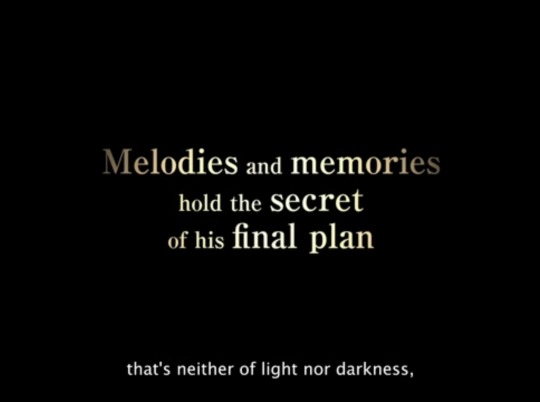
I decided to watch some old KH trailers in honor of the anniversary today, and I have to admit, I don’t think I ever rewatched this one after the release of Melody of Memory. When it was first revealed, we were under the assumption that the Master of Masters was the opponent Kairi was facing, but as we now know, it was actually Master Xehanort.
While we were aware that the Master of Masters has more plans and tricks up his sleeve, to think of this line in the context of Xehanort is a little different. It brought to mind an old theory of mine, so I decided to go back to KH3, Re:Mind, KHDR, and MoM to compile as much evidence as possible for it.
(As a disclaimer, it slightly undermines the authenticity of his ‘conclusion’ in KH3, so if you’re a big fan of that scene, feel free to skip this one.)

This line in KH3 is a good place to start. From the get go, it was established that Xehanort planned for nearly every possible outcome of the Keyblade War. I also think it’s safe to say that every action he made was an intentional choice based on these plans.
So the question is, what is the “final plan” referenced in Melody of Memory’s trailer? I think the game gave us the answer:

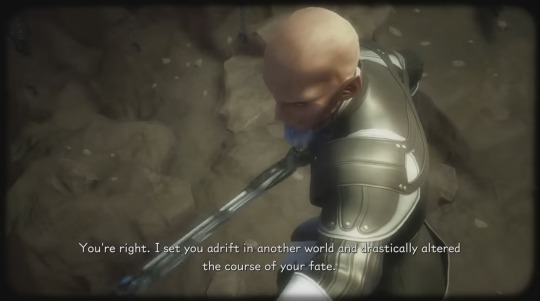

It may be easy to jump to the conclusion that this was just a plan for revenge, since Sora is the one who stopped Xehanort to begin with. However, I want to reaffirm that every action he takes is for a reason that serves his goals. It wasn’t just a plan to make Sora disappear, but likely to make him disappear to Quadratum specifically.


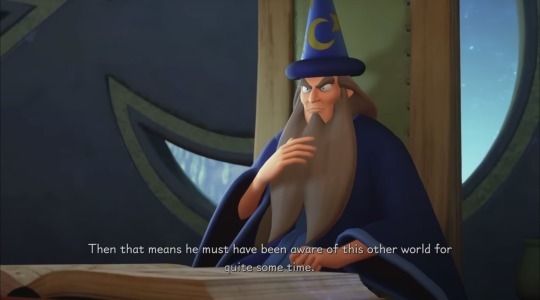
This was even foreshadowed in KH3’s Toy Box world. Young Xehanort sends Sora to the world of Verum Rex—though it’s probably closer to a “data” version in this instance:

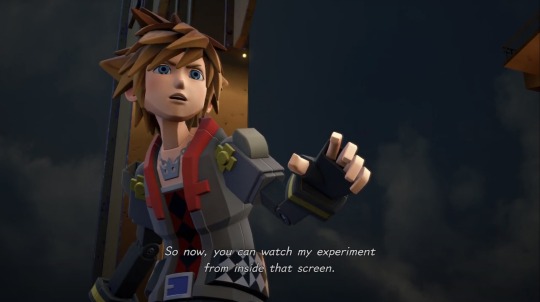
YX in particular is very confident that Sora’s overuse of the Power of Waking will lead to his disappearance:
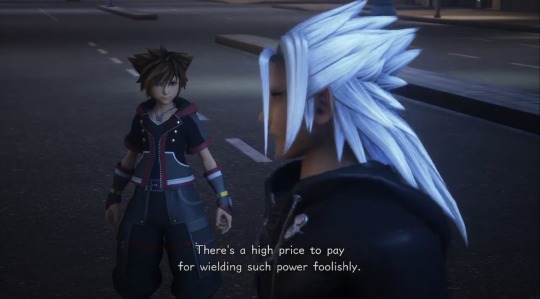
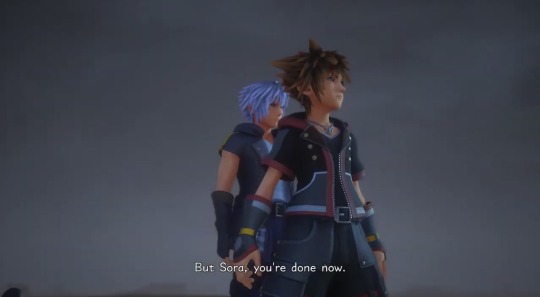
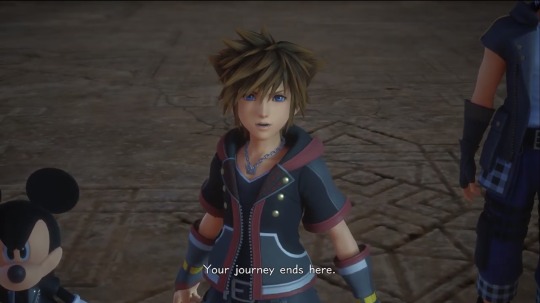


And MX has a similar line in Re:Mind:
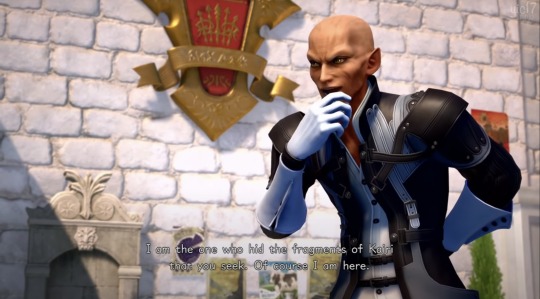
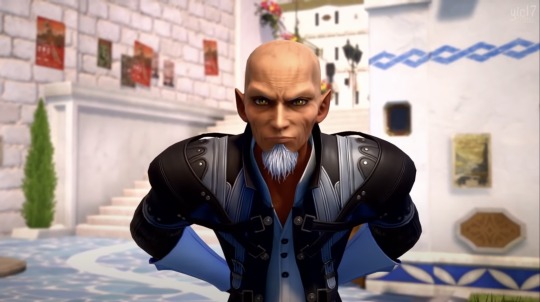


Except this is where things get interesting. The Sora in Re:Mind is time-traveling from a point in time after he defeated Xehanort.


Xehanort must know this, because he sees the real Sora (from this point in time) about to begin the final battle in the distance. He then acknowledges that the Sora he’s speaking to is from the future.
Unless he witnesses the present Sora time travel during their final confrontation, he can conclude that Sora survives their fight to time travel later on—meaning his plan doesn’t come to fruition. Sora unknowingly reveals his hand in Re:Mind this way, and opens the door for Xehanort to plan accordingly—which is kind of mind-breaking to think about…
It gets even better here, during Sora’s fight with Terra-Xehanort:
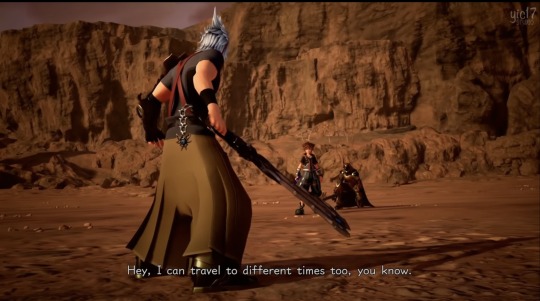
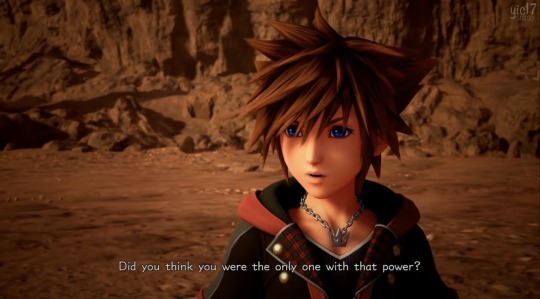
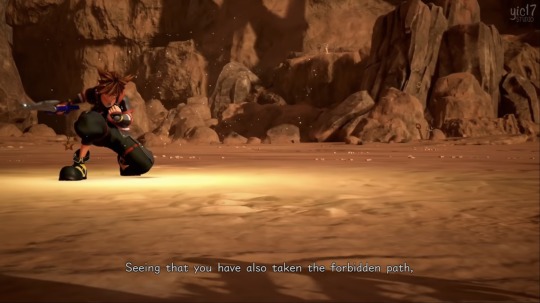
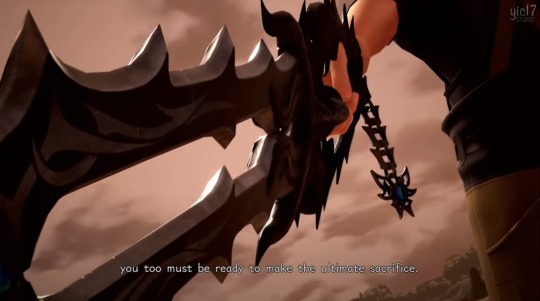
Sora brags that, like Xehanort, he can also time travel. To which Xehanort responds that Sora will then also need to make the “ultimate sacrifice”, or in other words, “pay the ultimate price”, as MX said. “Also”—as in, Xehanort has made this sacrifice as well by time traveling.
As in, Xehanort will also disappear to Quadratum.
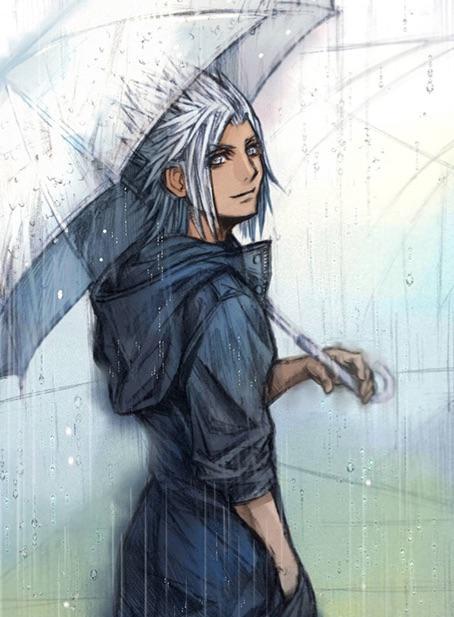
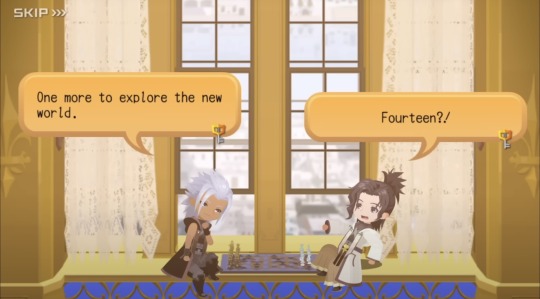
We have evidence to believe that as well. I also like the interpretation that he intentionally planned this to survive the world being purged, but that’s kind of a separate theory.
So to recap, Xehanort was probably aware that Sora would survive their final confrontation in order to time travel afterwards. He correctly predicts that the consequence for time traveling would be to disappear… specifically to Quadratum—something that Melody of Memory considers his “final plan”.
So… why? Why would he want Sora to also disappear to Quadratum? Trying to answer that question leads to the most controversial part of this theory:
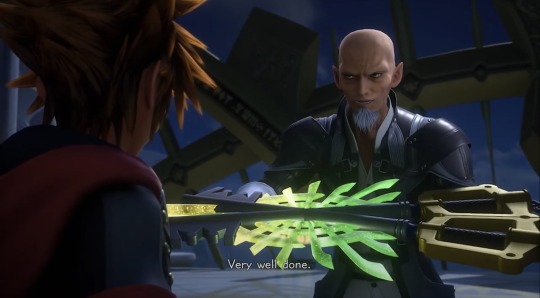

It’s really nice to believe that Xehanort gave Sora the X-blade as an admission of his defeat, and I’m definitely not against that interpretation. But it is a little strange that before—and after—this scene, in Melody of Memory, he continues to act like making Sora disappear was his big plan. It doesn’t feel right, if he was supposed to be letting Sora “win” here.
I’ll be very curious to see if Xehanort has a role in Quadratum, and why exactly he “paved the way” for Sora to be there as well. Either way, I am holding out for a geniune change of heart from him, especially if what we saw in KH3 was more of a manipulation.
#Sorry to anyone who has heard me ramble about this before#but this time I brought a little more evidence to the table—haha#I’ve tried to type this up before but I always get shy about posting it because I don’t want to “ruin” kh3’s ending for anyone#But in all honesty as a Xehanort fan I would *like* this theory to be true#because I feel like it could ultimately lead to a more satisfying redemption for him
72 notes
·
View notes
Text
Side-note on Octopath Traveler H'aanit
(since I had an ask that I chose to make about her today)
I always felt like the title of her story boss lead-in track, "For Master" (師匠のために), was a bit of an outlier relative to the others and doesn't mesh quite as well with her (very well-done!) story arc.
Most other Octopath "keywords" that come in via the soundtrack are more nuanced in terms of what the character's goal is and what they ultimately achieve as a result of their quest. Olberic's sought-after "Redemption" changes shape from simply tracking down and beating Erhardt to finding the man truly responsible for Hornberg's demise, but in the process he redeems Erhardt as well and finds real redemption in fighting for a cause and freeing the town that Werner holds dominion over. Tressa's "Treasure" is something concrete she sets out to find in chapter 3, and achieves, but Noa Wyndham's hand in marriage the experiences on her journey and the diary she kept of them turns out to be the real treasure.
These "For" keywords are almost always chosen with a strong double entendre to coincide with the twists in a character's story arc. Like with Therion, whose journey for "Freedom" from the bangle turns into something that sets him free from Darius and his past more generally, allowing him to look for the future. There's a lot of the ethos of squeezing the character's journey down to a word that changes meaning with the shift in context between chapter 1 and chapter 4, which I love as a writer. Pick a single word which the story can grow around, such that its original meaning and the new contextual meaning shine together like interwoven rainbows from a prism in a sunbeam.
On one level, H'aanit is on a quest to find her master Z'aanta, then rescue him from his petrification curse, but her journey takes on more significance once she fights the dragon. She's becoming a legend, a master hunter in her own right, ultimately slaying the Redeye where Z'aanta failed, and ending up with tall tales to tell him. Her journey always felt to me like it was about becoming a master, and finding it in herself to become one, rather than just looking for a specific person. However, since she never finds an apprentice, the choice of "師匠", a master in the sense of an instructor or a teacher, feels slightly misplaced. Maybe if she had a kid aiming to learn from her in her chapter one, then she was finally able to go home and give those lessons at the end of her story, it would have landed better.
Alternatively, something like "For Quarry" might have been nicer. Since her quest starts out as a hunt for Z'aanta, then becomes a quest to slay the Redeye. It has the bonus of carrying extra nuance of putting Graham out of his misery once endgame lore drops. (Since that was something she did "for" him, albeit unknowingly.)
Other "For _" comments:
Primrose, who sets out for "Revenge" and does indeed achieve total and fairly satisfying revenge, is admittedly a bit of a counterexample. Albiet a slightly more bitter pill because of all that Simeon bullshit.
Ophilia, meanwhile, is like a weird case where the original text is weak but the localized version is strong enough to hold up. Her pre-boss motif is "For Light" (試練のために). The original text could more directly be translated as "For the Ritual" or "For the Kindling", but Ophilia's involvement with the church is as much about her family, her adoptive father Josef and sister Lianna, than it is a strong attachment to the dogma per se. It's a major character focus that her sister was supposed to be the flamebearer but Ophilia took over so she could be with their father. And in the finale of the Ophilia arc, the focus is on saving her sister, bringing her back to the light, much more so than on the trial of the flamebearer per se. In that way, "For Light" is great because it can be about the kindling, but it's also very much about bringing Lianna back into the light.
#h'aanit#octopath traveler#olberic eisenberg#tressa colzione#therion#primrose azelhart#ophilia clement#over-analyzing octopath arc words hours
10 notes
·
View notes
Note
20 and 22 for the ask game?
20. you can only change one plotline in the entire canon—what would it be and how would you alter it?
FUCKKKKK ONLY ONE? hmmm....
I do think there is a part of this question that is phrased strangely, I understand the "only one plotline" thing in theory because it requires you to limit yourself to one decisive answer. But that also kind of implies that the One Plotline you're changing has changes that are all self-contained and ultimately return things to the status quo, which is typically not why I would make a change in plot to begin with. If I'm making one big major change in the plot, typically its going to be something major enough that the rest of the series is affected, which kind of conflicts with how the question is intended...
With that in mind... I mean the easy answer is something Aaron-related, but honestly most of his issues stem from a character standpoint given he rarely ever drives the plot forward meaningfully unless he's literally killing himself lol. There's not a lot of single isolated plot issues for him, I don't know if I could fix him without really going back to the roots and really domino-effect-ing him and how he interacts with the rest of the plot moving forward. sooooo...
If I had to do a more self-contained plotline change, it'd be the circumstances around Garroth's S1 betrayal. Easily.
Judging by how quickly everyone forgives him, the series itself seems to forget that people got hurt, killed, and had years of their life stolen because Garroth got mad that Aphmau maybe romantically liked someone else. It relies on miscommunication and poor characterization to even be executed at all. Eek.
Canonically, one of his biggest weaknesses is that he invests too much into people. He couldn't kill Zenix despite Zenix actively trying to kill him multiple times because of how much time and love there had been between them. Are we really expected to believe he'd betray Aphmau on the off chance she might've done something that could've hurt his feelings? Are you kidding me? This is stupid.
Seeing as how the series treats him as if his motives are already easily forgivable and justified, just changing the motive to be... actually that, keeps the change relatively self-contained here. So! Lets give him a motive that actually makes sense here:
Zane promises the war will be endless unless Garroth gets him what he wants. He's scared of O'khasis' military might and knows what they can do. Lillian is still a method of coercion, mostly as a contact point between him and Zane.
He's trapped in a lose-lose situation, both actions causing Phoenix Drop harm, growing sick and locking himself in his room from fear and indecision. It culminates in his betrayal in the S1 finale, his fear of O'khasis and Garte outweighing his trust in Aphmau and Phoenix Drop. This leads into a much more viable change of heart in the S1 finale, and a much more natural redemption afterwards.
22. who's the character that you most identify with and why?
looks up to my url. looks back at this ask. looks up at my url again. looks at you. looks to my icon. looks to my header. looks to this ask. yeah it's vylad why do you ask.
No but on a serious note, I think it's natural to put pieces of yourself into characters, and with Vylad that comes very naturally to me. He has always fascinated me, even since before we had much confirmed about him (I very vivdly remember trying to talk to people about him being the Elusive Third Sibling of Garroth during S1, only to get VERY confused responses). When he got properly introduced in S2, only to justify basically everything I had ever theorized about him to be right, it was very satisfying lol. I don't think I can fully answer the "why" here without getting very personal, but here's some stuff I feel comfortable sharing!
Green and red are important colors for Vylad, and they're important for me too!! Green has basically always been my favorite color since the dawn of time, although I did go through a strong purple phase when I was younger.
The way he acts and behaves can be very easily read as autistic/otherwise neurodivergent. I saw/still see a lot of my behaviors in him in a way that made him very comforting to me when I was first watching the series in 2015, and still makes him very endearing to me now ^-^
I am a sucker for characters who go through a literal death + transformation afterwards. Big fan of symbolism. Somewhat for transgender reasons personally, but also stuff beyond that.
speaking of transgender: nonbiney :) and while we're at it hes one of the most explicitly lgbt characters we've got. gay people!!!!! woooooo!!!!!!!!!!
we've both got freckles heehee :D
This comic was based off some very personal musings of mine, so much so that I almost didn't post it lol. His strange relationship with not-religion is very important to me.
Weirdly enough though, I'm not a sibling! I very very frequently find myself identifying with characters that have strange sibling relationships, but I'm an only child! I don't know why this keeps happening.
16 notes
·
View notes
Text
Since Disney decided to be a bunch of jerks and locked the remainder of The Owl House into a schedule that gives no time whatsoever for fleshing out Belos' character, I want to talk about the two possibilities I see for his development in a world where they let Dana do what she wanted. I don't know if either of these were Dana's intention (maybe Belos was never going to have more depth than he does now!), but I like to think about the possibilities.
Both of my ideas start out the same way: delving deeper into how being raised in early 15th century Connecticut shaped Phillip's priorities and values. This naturally leads into how those things drove the way he dealt with the Caleb and Evelyn situation. They've already given the bare bones of this with the stories and snippets of flashbacks we've gotten so far, but this would have them go much deeper, make the more empathetic audience members come to the uncomfortable realization that they might have done the same thing in his shoes.
This would all culminate in a detailed flashback of the major confrontation between Philip and Caleb (and yes, I do believe they could do this justice without making it too graphic for Disney), and lean into the "I tried to save your soul" line they threw into the"For The Future" episode, because that feels very Puritan to me. I think that played a big role.
Next, we would explore the unfathomable pain Philip lived with after killing his brother, and how he tried to "fix" the situation. We would explore how that quest changed him, how he slowly lost more and more of himself until we were left with Belos, a being nearly unrecognizable from the little kid back in Connecticut.
Now, this is where the path diverges.
Option 1: The protagonists learn of all this and come to understand how Phillip became a monster, and try to tell Belos he can still be good, he can still change. But he tells them that it's too late for him, or better yet, he's so deep in his own rationalizations he doesn't even see that he's in the wrong anymore. The heroes ultimately destroy him, but it's not a fun satisfying thing: it's bittersweet. It's the end of a tragedy.
Option 2: The protagonists learn of all this and come to understand how he became a monster, and try to tell Belos that they understand he went through a lot of pain, but what he's doing isn't going to change things, it isn't going to help. They help him see that while he can never undo the past, he can work to make the future better. Instead of killing him, Belos becomes something of an ally, even if not a friend. The series either ends at the start of Belos' redemption journey, or follows it along now and again as the show continues with a different threat. Either way, the emphasis is not on Philip "becoming a good guy" or "paying for what he's done," it's on Phillip taking steps to make a change in his life and help heal some of the damage he's done.
Option 2 is my preference by a long shot, but I've only seen this done properly for a level of villain like Belos in one show: Steven Universe. So it's pretty rare. Still...while The Owl House certainly hasn't fully embraced this level of complexity with its redemption arcs (Amity and Willow's conflict was ultimately reduced to 'Amity's mother's fault'), they did come pretty close with Lilith's redemption arc. So it's possible these writers could have done it with Belos too with a ton more time.
18 notes
·
View notes
Text
Anakin knows what he’s doing is wrong...
Whenever I read people using the idea that “from Anakin’s point of view the Jedi are evil” as the ultimate proof that he felt bullied by them, I roll my eyes. Anakin is intelligent enough to know when he’s wrong.

He doesn’t really think the Jedi are evil, he’s lying to himself, he bought his own con.
Anakin was a good kid to begin with, and with the Jedi training he became a great man. If you look at things objectively, Anakin is 90% of a great Jedi. He’s seemingly learned all the rules, and is wise enough to teach them to others:
Be it by telling Ahsoka that she needs to follow the rules, she can’t just go around and do whatever she feels like, it’ll lead to trouble…

… by encouraging his Padawan not to be too hard on herself…

… or be it by encouraging rational thought over hotheadedness.

In that last image, Anakin is Anakin telling Ahsoka and Rex to stop letting their emotions do the thinking and act logically. He’s telling them to be prudent.
Hell, he even believes that patience is a virtue.

Anakin is a trained Jedi Knight. He has the theoretical know-how to get out of his problems, in ROTS.
In fact, a lot of people forget this, but Anakin’s first instinct, upon finding out Palpatine is, in fact, Darth Sidious, is this:
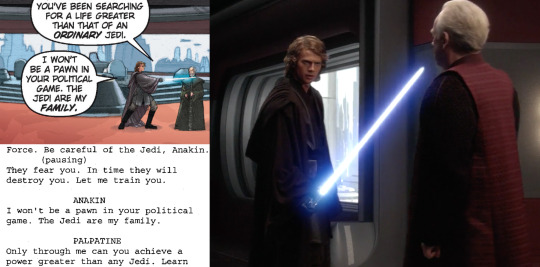
The Jedi are Anakin’s family. If Palpatine is asking Anakin to choose between the Chancellor and the Jedi, he’ll choose the Jedi every damn time (which is why Palpatine makes Anakin choose between the Jedi and Padmé, instead).
So where’s the problem?
That last 10% of what makes a great Jedi. Introspection, self-control.
Despite being wise, clever and thinking rationally - Anakin has trouble applying those lessons to himself.
When it comes to his own personal problems, he's hard on himself, he’s impatient, he breaks the rules and acts out of emotion instead of thinking things through.
As Obi-Wan puts it:
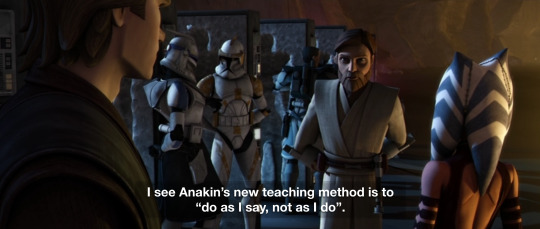
As a result of this flaw, Anakin keeps choosing the wrong path, despite knowing that it’s the wrong path. The Force puts a lot of tests in front of him, and he keeps choosing the easy way out, rather than the more difficult but ultimately satisfying path.
His mother was killed. He can choose to genocide a whole Tusken village, or be the better man and just walk away.
He kills the Tuskens.
Dooku is unarmed and helpless. Anakin can either kill him in a rage, out of revenge, or he can capture him, bring him to justice, and potentially discover the identity of the second Sith Lord.
He kills Dooku.
Windu is also helpless (his hand was just cut off by Anakin) and Palpatine is killing him. Anakin can either choose to save Windu and arrest Palpatine (who just revealed that he wasn’t “too weak” after all), or he can let Windu die.
He lets Windu die.
Padmé tells him that this isn’t what she wants. He can actually listen to her wishes. Or he can go on a maniacal rant about having ultimate power, ignoring her own opinions completely.
He goes on a rant, drunk with power. Then chokes her.
Obi-Wan tells him to stop, tries to reason with him: Chancellor Palpatine is evil. Anakin knows this. He can stop lying to himself and accept his mistakes, ending the fight. Or he can give Obi-Wan his two-cent rationalization about the Jedi being evil (which he doesn’t even really believe in), and keep trying to kill Obi-Wan.
He keeps trying to kill Obi-Wan.
The more the War goes on, the more it gets easy for Anakin to take the easy path, over and over. But he knows it’s the wrong thing to do.
In the director’s commentary of Revenge of the Sith, George Lucas said this about the following two scenes:
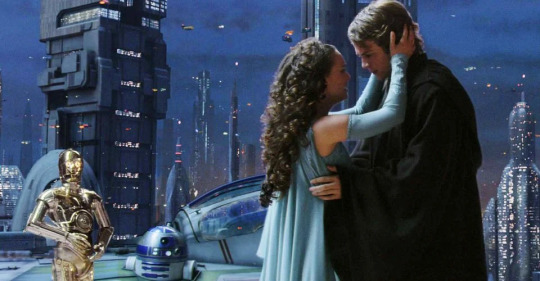
“I like this scene because he's lying to her and he's rationalizing it at the same time by saying he's doing it all for her. He's loyal to the senate and the chancellor and her. But in the end- I mean, he's twisted every fact to his own rationale to make it seem like it's okay, but in the process of lying to her he's actually just lying to himself and rationalizing his behavior. 'Cause he knows he's wrong, but he won't admit it […] he's too far gone- that he could murder a bunch of kids… and then go and rationalize it to her as just doing his job.”
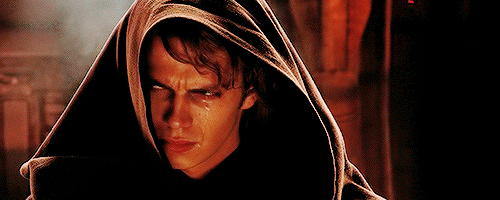
“The tear [on Anakin’s face] says that he knows what he's done, but he has now committed himself to a path that he may not agree with… but he is going to go on anyway. It's the one moment that says he's self-aware that he's rationalizing all his behavior. He's doing terrible things, but in the end he really knows the truth. He knows that he's evil now, and there's nothing he can do about it.”
Anakin tells himself that he’s doing this for Padmé, he’s doing this because the Jedi betrayed him, blabla.
Truth is? He’s just really really scared. And that made him do really bad things.
There’s this incredible moment in Darth Vader: Lord of the Sith #5.
Vader has taken the lightsaber off a Jedi, and now he has to corrupt the saber’s crystal to get his red blade.
The crystal, and by extension, the Force, showed him a vision, a path where he turned to the Light, defeated the Emperor and put an end to his suffering. A path of redemption. This was his reaction:
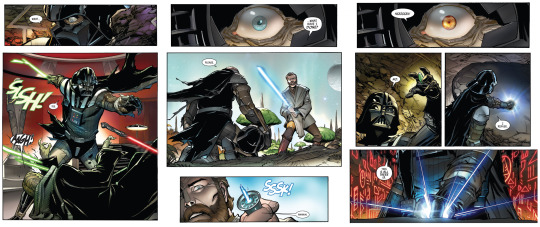
Vader refuses to take the hard path and chooses the easy path instead, once again. He rejects the Light and hangs on to the pain… because deep down… below the “they betrayed me” bullshit he keeps telling himself… he thinks he deserves it, because he did the wrong thing.
Anakin knows he’s wrong and he’s still goes forward with doing the wrong thing, no matter what test the Force keeps throwing his way.
And that’s why his sacrifice in Return of the Jedi is so impactful. He finally does the right thing, he accepts that it’ll be hard, that he’ll die if he saves Luke… he doesn’t care. Luke loves him, like Padmé did. He failed once. He won’t fail again.
I’m gonna conclude this with one more quote from Lucas:
“It really has to do with learning. Children teach you compassion. They teach you to love unconditionally. Anakin can’t be redeemed for all the pain and suffering he’s caused. He doesn’t right the wrongs, but he stops the horror. The end of the Saga is simply Anakin saying:
‘I care about this person, regardless of what it means to me. I will throw away everything that I have, everything that I have grown to love - primarily the Emperor - and throw away my life, to save this person. And I’m doing this because he has faith in me, loves me despite all the horrible things I’ve done. I broke his mother’s heart, but he still cares about me, and I can’t let that die’.”
#Anakin Skywalker#the hero with no fear#jedi#jedi order#star wars#long post#still#meta#but#it's#a#really#long fucking post#but hey#Anakin#is a lovable#dork#so he deserves it
5K notes
·
View notes
Note
Also considering how Alina seems being this saviour of Ravka as a burden(though that doesn’t equate hating being Grisha or her powers because that’s not the case!)you would think she would listen more to Aleksander’s POV and decide that keeping the Fold isn’t a bad solution. She can still destroy the Volcra but the Fold as whole could serve as a threat to other countries and could actually leads to the end of the war. At the end she did much worse to Ravka than Aleksander yet he’s the one getting vilified while she gets to reap the benefits of the system that’s abusing her people. What a nice message there,B*rdugo and how convenient that she ends the series(for now)with Zoya being a queen even though she has neither the training nor ability to be a good leader and we have no idea what type of queen she would be.
(Book Spoilers particularly from ROW)
This may be a controversial statement I don't know, and to be completely transparent I am saying this having not read the duology but I honestly think LB made a mistake in going back to the original trilogy characters in the duology. I feel like she should have just left it alone. I mean she had a good thing going with the six of crows characters, from what I can tell people really liked those books and those characters. I can get what she was trying to do, she was a young writer when she wrote the original trilogy and she made some mistakes and wanted to fix them. However from what I've seen of people's reactions to the duology it seems like her trying to fix the mistakes just made those mistakes more obvious and caused alot of contradictions. People expressed their anger at how Alina was stripped of her powers and that this didn't exactly scream female empowerment and so she tried to fix it by making Zoya overpowered but this just highlighted how tragic Alina's fate was. People were upset that there wasn't a grisha on the throne and that it was a Lantsov who even though he was a nice guy was still part of the royal family that had kept the grisha in subjugation, who got the throne. She tried to fix this by putting Zoya on the throne but this didn't make sense because just like how Alina didn't have the training or experience to be general of the second army in S&S Zoya doesn't have the training or experience to be queen. Also I think alot of people felt like it should have been the conclusion of Alina's story, that she should have been that grisha queen and so seeing it go to Zoya, a character that had been mean and unpleasant towards Alina, left a bitter taste in alot of fans mouths. Again it also highlighted just how bad Alina's ending was. The other thing alot of people had an issue with was the darkling's death. So she brings him back and tries to give him a redemption arc. I also find it funny when antis argue that the darkling shouldn't get a redemption arc in the show because he's evil and not every villain should get a redemption. I also find it funny that LB said in an interview that she thinks the darkling is beyond redemption because she literally gave him a redemption arc in ROW! Like correct me if I am wrong because this is based off what others have told me but he sacrifices himself to save everyone else. He went from being someone who the narrative tells us is selfish and power hungry, to someone who makes the ultimate sacrifice in order to spare others lives and save the world, what is that if not a redemption? The definition of a redemption arc is when a antagonist does something to make up for their past sins and mistakes. I feel like suffering through eternal torture to save the world covers that personally. However again this is a fix that doesn't completely satisfy because whilst yes the darkling becomes the self sacrificing hero it is written in a way that, one still serves as more of a punishment and two is begrudgingly given, I mean there's a scene where the 'heroes' debate whether or not they should let him play the part of the hero. To be honest when I read that extract I actually found it really uncomfortable and well icky. I mean it was these same people that had caused the problem in the first place by not listening to the darkling when he said they should destroy the fold they should use it as a tool and weapon against their enemies, now they are mocking the darkling's solution because heaven forbid they let him be seen as a hero for making a sacrifice that will cause him an eternity of endless suffering. I mean when you think about what the darkling was going to have to go through in order to save them all its really appalling to see these supposed heroes talking so callously and with so little empathy about it. It was actually that extract that made me finally decide that I definitely wasn't going to waste my time reading the whole duology. But I really do think it would have been better if she had just left those characters as they were and either focussed on the six of crows or
created a whole new world with new characters. But as always that's just my opinion.
48 notes
·
View notes
Text
he is a terrible man. and yet amongst men, he is the most beautiful of characters.
Character Analysis for Askeladd of Vinland saga
On the surface, Askeladd is nothing more than a self-serving man. He is cunning, charming, and intelligent, qualities that no matter the disdain people have for his abrasive personality, have earned him respect amongst the Vikings, and beyond. Floki respects his intelligence enough to approach him to request the killing of a man who is regarded to be the strongest amongst all warriors. This being his first appearance is a solid testament to his ability to overcome any predicament – the basis of his development as a character throughout the Vinland Saga prologue. His men trust in all of his decisions, no matter how rash. They believe him to be as lucky as he is intelligent. His intelligence, wisdom and kindness complements the air of arrogance with which he carries himself. When hosted by his uncle Gorm, he laughs at him, before imparting wisdom on a young man who tells him that he would sooner die than live without pride. He says:
“Look. It’s terrible. The guy who’s a slave to money holds a whip and pretends to be the master of the slave he bought with his money. He just doesn’t realise it himself. Everyone is a slave to something.”

Such a sense of wisdom places Askeladd as a tool for Yukimura to present and explore the status of elders in Norse society. As an elder to Thorfinn, he guides him through different trials and encourages him to push his limits as a warrior, and become a better combatant. Regardless of whether or not life at war is the best option for Thorfinn, Askeladd always believes in him and his ability, and though he never expresses verbally his concern for Thorfinn’s wellbeing, he always shows an interest in Thorfinn’s safety and is always waiting for his return where the rest of his band do not care. To the other Vikings, Thorfinn is just another one of their men. Bjorn says of Thorfinn, “You trusted in his [Thorfinn’s] luck too much this time. It doesn’t matter. I didn’t lose anything.” This statement also reflects the stark individualism displayed by Vikings – although they may work together in bands of warriors or mercenaries or otherwise, they do so to serve their own interests – honour, valour, wealth, among many things. But to Askeladd, he is someone important - someone he cares for. When one considers the question of whether life at war is the best for Thorfinn the answer to this question evidences Askeladd’s selfishness. Despite knowing that life as a warrior is not the best for Thorfinn, he still uses him as a tool to further his own goals. In his own words, “It’s just easy to make use of an idiot who is not afraid of anything.”
There are, however, multiple occasions on which Askeladd appears to be straying from the typical Viking individualism of the era. The first example of this, is his kindness towards Thorfinn, as introduced in the previous paragraph. Amongst Vikings, such ideas of care and brotherhood are ultimately trumped by ideas of valour in battle and honour in death. One would not be greatly concerned with the death of one’s companions as long as they are assured that the departed are well on their way to the esteemed Valhalla – however the concern that Askeladd shows towards Thorfinn is evidence of his holding of attitudes that were unconventional for his time. This ties into the subtle revelation towards the end of the prologue that Askeladd does not believe that life at war is honourable, and does not hold the Viking people in esteem because of this; going so far as to disdain his own Norse heritage in favour of his Welsh heritage. His final actions and his final words reflect his sentiment from episode 10, Ragnarok, in which he declares:
"This is the age of twilight, Bjorn. Let’s go out with a bang."

In his final moments, he kills King Sweyn to protect both his motherland of Wales and the young Prince Canute. In this, he sacrifices himself to protect what is dear to him – and to protect King Canute who he grows to respect as a man with potential to be great in their short period of companionship. This is him leaving his mark on the age of twilight; this is him going out with a bang. He tells Thorfinn:
“In the future, after I die, how do you plan to live your life, Thorfinn? You haven’t thought about it, right? Move forward already. Don’t stay stuck in a boring place like this forever. Go far ahead, go beyond the world where Thors went. You’re Thors’ son. Go. That’s your real fight. Become a true warrior son of Thors.”

These last words reflect multiple things that are introduced at the beginning of the prologue and explored throughout it, the first being Askeladd’s feelings towards Thors. At the beginning of the prologue, Askeladd shows great respect to Thors throughout the duration of their battle. He outwardly expresses an appreciation for his strength, saying that he “could lead a whole army”. This statement shows that Thors is a man who is both physically strong and strong in character, and that Askeladd recognises this. He then asks of him, “why don’t you become our leader?” which shocks his men – as mentioned before they trust in him absolutely and are already surprised to see a man who can best him in hand-to-hand combat. However, none of them express dissent to this; whether this is out of shock or acceptance is open to interpretation. When he backtracks on this statement and says he’s only joking, one of the young men from the village try to attack Askeladd, to which he responds
“Damn kid. You should start valuing your life. You should be grateful to Thors. He was a man who was worth more than a hundred bratty kids like you.”
Askeladd greatly respects Thors and despite his decision, holds him in high esteem. The first part of this statement also reflects on his belief in – or at the very least respect for – Thors and his philosophy. He calls him a man of great value and he scolds the young man who he perceives as disrespecting the sacrifice that Thors made to keep him alive. “Don’t stay in a boring place like this” refers generally to the life of a warrior as opposed to their physical location of the king’s court. As detailed briefly above, Askeladd disdains the life of a warrior, and disdains the Vikings for it. Therefore, when he reminds Thorfinn “You’re Thors’ son”, he believes that Thorfinn Karlsefni has the potential to be as great as his father, if not more so. He believes that he can grow to become something greater than a warrior.
The second idea that this quote reflects is that of Askeladd’s care and concern for Thorfinn. He asks, “You haven’t thought about it, right?”. Askeladd has thought about how Thorfinn has been mentally since the passing of his father. Thorfinn has a stark hatred of battle and engages in it purely because of the hatred he has for Askeladd, and the proximity it gives him to his goal of killing him. Askeladd is aware of this. In his last moments, he could have been unkind and goading towards Thorfinn as he had been in the past – but instead he pushes him to seek something better. He knows that Thorfinn has been suffering emotionally and hasn’t known happiness from the day they met. Askeladd doesn’t appear as a man who wants to seek redemption – he wants Thorfinn to find happiness now that he has nowhere to direct the anger that has been his only motivator for the greater part of his childhood. From this, one could argue that Askeladd’s selfishness trumped his desire for Thorfinn to be happy. However, very early on in the prologue, Askeladd hints at his acceptance of defeat at Thorfinn’s hand.
"You’ve grown a lot. Well, time is on your side. You’re going to grow, and I’m going to get old. Someday, I’m going to lose to you. It’s only natural. Even the strongest dies someday."
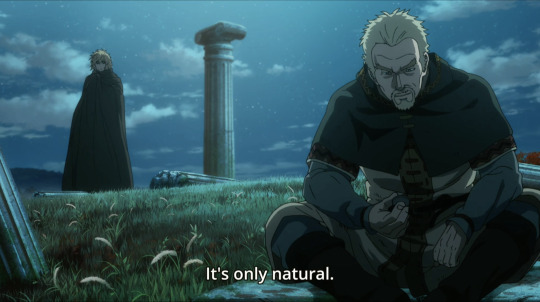
Askeladd doesn’t attempt to dissuade Thorfinn from his desire for vengeance. Rather he tries to guide him towards the idea that vengeance is empty, and that any defeat he faces at Thorfinn’s hand is meaningless in the face of the natural order of the world. He knows that it is pointless to try and calm the resentment that Thorfinn harbours towards him; he knows the gravity of his sin and can’t tell Thorfinn not to hate him for it. From this, we can begin to explore the idea that Askeladd is similar to Thorfinn and sees himself in the younger man. Askeladd is just as full of hatred as Thorfinn is – as much as he is to a father figure to Thorfinn as a man, as a character, he serves as both a parallel and a foil to Thorfinn.
Askeladd is just as full of hatred as Thorfinn. His mother, Lydia, was taken from her homeland of Wales as a concubine to Olaf, and when she grew sick, she was of no value to him. She and her son were discarded and Askeladd grew to despise his father, and by extension his people. Askeladd, like Thorfinn, learned from the man he hated the most and sought revenge against him. Askeladd was successful in killing his father but his disdain for the Viking way of life and his bloodline led him to harbour resentment even into his old age. He is therefore a parallel to Thorfinn in that they both resent battle and war but tolerate it as a means to satisfying their own end. Askeladd, however, has seen and experienced first-hand the effects of Viking conquest on the innocent. Thorfinn has only seen it from the eyes of the oppressor.
Despite this, both continue to kill.
Askeladd’s ability to relate to Thorfinn’s anger is what makes him such a good father figure to him. He knows what it means to be so consumed by anger that you see nothing else, that you live for nothing else – to endure something you despise for the sake of vengeance. He knows that Thorfinn is miserable, and hurting, and lonely, because he is too. Such a sense of relatability is what puts him in a position to understand and take care of Thorfinn. It is because he understands how Thorfinn feels that he does not attempt to dissuade him from following him around in the hopes of killing him. He knows that Thorfinn cannot let go of the anger he has until he sees the recipient of that anger gone, because he too suffers from the same affliction. Therefore, it is not selfishness that drives Askeladd to keep Thorfinn around in his suffering – it is resignation; the same resignation he displays when he says that he will someday lose to Thorfinn.
Askeladd proves himself throughout his life to be ahead of his time. He is wise, caring, and understanding; but he is also cold, cunning, and ruthless. Man is not absolute, and Askeladd is no exception. But from those of his time, he is far above men – even with each and every of his nuances and flaws. he comes close to attaining the status of a true warrior as Thors was – and maybe if he had had more time, he could’ve seen his mother’s dream come true. The world is never that simple.

word from the writer:
When Askeladd was first introduced to me, he appeared to me as a terrible man. His intelligence and his strength is terrifying. A man who can kill for his own gain, without remorse. Such a terrible man. But amongst men he is the most beautiful of characters.
When I was writing this I wanted it to be a prelude to my upcoming essay on his relationship with Thorfinn. To some degree I’ve covered that here, so the next piece will most likely be on how Thorfinn views him and I would also like to talk about his relationship with prince Canute. Askeladd, despite not seeming like it, is a very fatherly man and I love looking at how he interacts with the other members of the cast. I hope you enjoyed this, and I’d love to hear what you guys have to say about this. my asks are always open.
Please look forward to the next piece in my Vinland Saga series.
#vinland saga#thorfinn#askeladd#bjorn#makoto yukimura#seinen#manga#anime#vinland saga canute#canute the great#analysis#philosophy#thors#thorfinn karlsefni#lucius artorius castus#danish#vikings#individualism#wales
233 notes
·
View notes
Note
as both a ulquihime and ichihime shipper, what do you like about both ships?
This is probably way more than you asked for, but here you go:
As a preface: I watched the anime for the first time in the early 2010s, binging it until it ended in 2012, then set the series down until I picked up the manga around the beginning of 2016. During that time, I was not involved in the fandom AT ALL. When episode 3 came out and Orihime and Ichigo saved Sora’s soul, I decided I wanted them to be together. Then things changed. Ulquiorra captured my attention, and the Orihime was spending all her time with him, and I could see it. I could see it and I didn’t hate it. Ulquiorra was terrifying and seemingly unstoppable, but he was hot. I couldn’t hate the idea of him and Orihime together. But then, the protagonist came back and somehow asspulled himself back to life and Ulquiorra died, and with him, any idea of Orihime and him becoming more. So I regrouped and cheered for Ichihime and was elated when the epilogue came out.
But I never, ever, forgot about Ulquiorra.
When the final arc was starting to wind down, I decided that where canon ended was never going to be enough of the Bleach universe for me, so I started dipping my toes into the fandom. In the beginning, I alternated between which of these ships was my OTP. There was a time when I liked both ships equally. There was a long time after chapter 686 came out when I was still all about getting more Ichihime.
But I still couldn’t forget Ulquiorra.
These days, I like Ulquihime more, largely in part because it was never and will never be resolved. That open end is fuel for my imagination, whereas Ichihime has their happy ending. I can be satisfied with that, even though I never got a comprehensive story.
Now, to FINALLY get to your ask, what do I like about both ships:
Ichihime
General:
The canon OTP
The looks. The softness in their gazes when they look at each other. The fire in his eyes when he resolves to protect her. The adoration in her eyes when he makes a good decision.
The way they worry about each other.
The way Ichigo can relax and be the sweet, loving boy around her that he was with Masaki before her death stole his innocence. The way that Orihime is inspired to invest in herself and learn how to be strong enough to be an asset to him instead of a liability; to meet him at his level, instead of bringing him down to hers. Their bond is not performative. It is quiet, slow building, and strong. It feels healthy and organic and it makes me comfortable.
They are also physically and aesthetically compatible. To put it in animal husbandry terms, they make a good breeding pair. To put it in more pleasant terms, they are a good-looking couple. I want them to make the sweet, sweet love, and it doesn’t take a lot of imagination to consider the possibilities.
Although they are not as dynamic as other ships, I don’t find them dull. I think they are the opposite of dull, really. He thinks she is wonderful and mysterious and a good confidant and source of moral support, but he also thinks she is funny and they share taste in manga. She thinks he is cool and hilarious and worthy of admiration. They stick up for each other and gently tease each other. I prefer this kind of dynamic to a confrontational, bickering, competitive one between lovers. I have had both kinds of relationships IRL, and I would not wish the bantering one upmanship type on my worst enemy. I find it exhausting, demoralizing, and abusive. Give me a more soft spoken kind of love any day of the week.
The fandom:
The passion in the pre-canon days that went into analyzing the interactions between the characters - there were a lot of excellent arguments presented that helped me feel validated in shipping them before Kubo gave the ultimate validation.
There are a lot of really good ichihime fics (been a long time since I read one - now that ichihime is canon I don’t have to wonder about what could have been and just be satisfied by what is) and a fair amount of super cute artwork.
Ulquihime
General:
The other canon OTP/my favorite OTP
IT IS TABOO, NEED WE SAY MORE? Lol jk
THE AESTHETIC - monster/cinnamon roll; black/auburn; pure princess/devil; maiden/mercenary - all high drama/high beauty archetypes
THE CHEMISTRY IS FIRE - while it never even comes close to anything as obvious as flirtation, the body language between them - the proximity, the posturing, the way he stands between her and any rival for her attention, the way she drops her guard and makes her body vulnerable to his despite being aware of the danger… It’s like watching a tango. The tension between them is always strung tight and delicious. Also, it is projection on my part here, but Ulquiorra isn’t interested in anything, ever, EXCEPT ORIHIME. Who wouldn’t want hot goth daddy’s full attention? Especially a fair maiden who has, for all intents and purposes, thrown away her old life in a noble sacrifice and has made peace with that, who finds herself in a strange, hostile new world with only said hot goth daddy (HGD) to talk to and tend to her needs. If she were to stay in that situation, I can only imagine the ways she might adapt to make her life more tolerable, including, but not limited to, experimenting with HGD and fantasizing about him.
THE LITERARY TROPES - I really don’t need to say more here, do I?
The huge effect they had on each other - people often take lifetimes to learn the deep lessons they taught each other in a short time.
THE WHAT MIGHT HAVE BEENS - The tragedy of Ulquiorra’s potential redemption and Orihime’s potential alternative destiny being lost to the sands of Hueco Mundo is both sorrowful and poetic as hell.
The unending What ifs that can be explored with these two is inspiring, which leads me to...
The fandom:
THE ART!!!!!!!!!!!!!! OMG THE ART!!! THE FICSSSSSSSSSSSSSSSS!!! Overall it’s sexier in this ship in regards to art and fics.
The community is small but just happy to still be alive, and is overall really lovely.
To sum up, there is a lot to love about both ships. Ichihime is a lovely, hopeful ship that has fulfilled its destiny. Ulquihime is a darker, enthralling ship that is ripe for the fandom to rekindle and ignite. Ichihime is Dvorak’s New World Symphony: Largo, and Ulquihime is Vivaldi’s Four Seasons: Winter. Both are good. Both have substance. They are different flavors, different timbres, different themes, and I love them both (but obviously one a little more than the other).
61 notes
·
View notes
Text
The Absolute Fuckery that was 15x20
Ok there were a lot of reasons why the final was bad. Like so many fucking reasons. Even without the queerbaiting,this is some of the worst writing I’ve ever seen and here’s a few reasons why:
Destiel
Yes. Big main reason here. They should not have included a confession and have one of the main plots of season 15 be Castiel’s and Dean’s relationship if they didn’t intend to follow through in any way. It shouldn’t have been introduced because the story became disjointed and thematically unsatisfying due to not being addressed in the final in any sort of way. Also, queerbaiting in 2020? Just to get your views up for the last few episodes because they knew Supernatural had become a shit show of bad ratings? Calculated and cruel toward the LGBTQIA+ community who has supported their careers for years.
Saileen
The absolute least they could have done was see this plot point through but they did not. We do not know if Eileen lives and even if they release information that she did, it’s still bullshit because we don’t get to see any part of her story. She has been reduced to a two dimensional character with no agency or purpose. Another woman just meant to prop up the male lead. Bullshit.
The Empty
What the fuck was the point of everything about this plot line if it would just be trashed half way through? Why did Cas make that deal with Ruby? Why did she beg to get out? Why did the Empty accuse Jack of making it loud? I really thought they were going somewhere with this one but they chickened out. There was so much potential for this; the angels and demons being awakened, balance being restored in heaven and hell, a big final show down between them and God. There were so many things just dropped when it came to this and that is why season 15 is absolutely frustrating because it feels like we just wasted our time with useless world building that didn’t amount to anything.
Kevin
I truly did think they’d address this in some sort of way, but the last time we saw Kevin, he was cursed to wander the earth until he became insane because his soul couldn’t ascend to heaven. I was really excited about this because I thought it meant there was going to be some restructuring of the Supernatural universe. The plot would be how the universe Chuck created wasn’t perfect and it had flaws and it was up to Team Free Will to fix some of these gaping holes. They made a point of calling it unfair. It was a wrong that should have been righted in some sort of way in the final.
Benny
This really isn’t just about Benny, it is about the concept of purgatory. A running theme in the show is that good people don’t deserve what happened to them. We see a lot of “good” monsters throughout the show. Characters who helped, sacrificed, and died for the brothers. At the end, they are sent to monster hell or purgatory. There was an episode this season where Sam and Dean killed a teenage boy who had been turned into a vampire. The teenage boy accepted his death because he knew it was for the best. He was afraid of hurting more people and he accepted that it was unfair. They made sure to emphasize how unjust the rules of this universe were and the emotional toll these universal rules took on the boys. Benny’s demise was spoken about briefly and we see Dean very hurt about his death. But the audience is left with the feeling that this is wrong. That the way the Supernatural universe is structured is wrong. Good people get turned into monsters, die, go to purgatory, and then die the ultimate death there. Is this what’s in store for all the “good monster” characters in the show? Garth? His family? They’re werewolves who fight their monster instincts, do they they still deserve purgatory? Did that teenage boy? A gaping hole that I thought the show was going to address in some way. Maybe offer redemption to those in purgatory or have Jack completely wipe away the concept of monsters in the universe. After all, it was just Chuck’s shitty writing, why couldn’t they wipe it clean and just leave people? “Cure” people of the monster and officially give the boys a way out of hunting? No monsters means no hunting. They’d be truly free. I thought this was direction they were going based off the certain episodes and characters discussed. But nope.
Jack
They reduced Jack’s character to plot food and that’s it. His ending was sloppy because it didn’t take into account any of the growth he’s had over the last three seasons. We predicted his ending from season 12 and that’s bad writing. Just. Awful writing. This character had dreams, motivations, relationships, but that all quite literally dissipated. He was used as a magic button that solved all their problems. 15x19 truly showed the lack of thought put into his character. He should not have been a main character if he didn’t have more influence on the plot than simply being a cop-out for having to write a well thought out solution. He was literally just there to snap his fingers and fix all their problems.
Dean
Oh yeah, Dean’s ending was a big fuck you to any character growth this character has had over the last 15 seasons. There is a line in his final 15 minute goodbye monologue where he says they always knew it would end this way. Which, exactly. We always thought it would end this way because it’s so goddamn predictable. It’s shitty writing because it doesn’t try to subvert this. It quite literally says that any growth Dean has had meant nothing because it didn’t change his end. Dean Winchester was always meant to die a young, bloody death. Everything he’s done, everything he’s bled and sacrificed for meant nothing. His prediction came true. It makes the audience wonder why they stuck around for this long ass journey if they knew the ending all along. It isn’t about what this character deserves. We have always known that the hero deserves happiness, but the ending should say something about why the story matters. Why did we see Dean struggle all his life about accepting himself? Loving himself? Seeing himself as someone who deserves to live? It was yet another theme and plot point throughout season 15. It’s what Castiel proclaimed to him in his confession and it is what Dean finally acknowledged by telling Chuck that’s not who he was. Dean Winchester is not a cold blooded killer. Dean Winchester deserved to live. It was beautiful character growth. A wonderful end to him. But they said fuck that when his last words were that he always knew it would end this way. That he always knew he wasn’t meant to live a long life. The writers wanted tears and they got them. I was crying, not because it was a beautiful satisfying death or ending, but because they tore apart 15 years of development for my beloved character. Dean Winchester has shown consistently that he wanted more than hunting, he wanted more than the life he got stuck with. But they didn’t follow through. They just decided to make an emotional ending because that was the coolest broest bro masculine thing to do.
Castiel
Literally everything. Literally fucking everything. Another character that was reduced to plot food. Castiel, the angel who rebelled against heaven and fell for the man he raised from perdition, was not deemed important enough to be in the final. This was the biggest fuck you of all. His story had become so complicated over the last few seasons and his purpose was kinda everywhere but they finally focused it when they had his happiness be Dean. When he said he found his faith when he found a family. When he became a father to someone who would one day save the universe. Castiel lived for the love he learned he was capable of. His ending just made no sense. I guess we’re supposed to assume Jack saved his from the empty but he wasn’t shown. He was not shown greeting Dean, the man he died for over and over again, his happiness. He was not shown being reunited with Jack, his faith. He was not shown enjoying the life he fell from grace for. He was a book with half its pages ripped out. Castiel didn’t get an ending. He got erased.
Sam
That fucking wig.
This is just some of my rambling thoughts I wanted to share will all of you. I have been a fan of this show for so many years. I invested so much time and love into something I’m going to look back on with bitter disappointment. Some of shittiest writing I have ever seen. Thanks for reading and add some more reasons. I know a missed a shit ton.
508 notes
·
View notes
Text
THIS is Chloe’s redemption arc
Hi! I don’t usually do big media analysis things, but I like Miraculous Ladybug and I’m a writer and familiar with these tropes. I was thinking about Chloe’s character in season 4 and how everyone’s been so upset with what seems like a reversal of her character arc, so I wanted to unpack everything and explain what I believe is going on.
In short: Chloe getting worse, becoming mean again, is the only way she can, after the three seasons she’s had so far, get a satisfying redemption arc.
Zoe is also very important to her arc; while it could perhaps have been done differently, Zoe’s introduction is perhaps the clearest way of developing Chloe’s character and giving her redemption. But I’ll get to that in a moment.
I recently rewatched the first half of season 1 and most of season 3, so I’ll probably draw from more recent memories in discussion here. Season 4 is, however, the main point of discussion in this post, so big spoiler warning if you aren’t up to date on Sole Crusher and Queen Banana at the very least.

So, character arcs can generally be shortened to a question of, ‘what does this character need to learn? And do they learn it?’, although typically there are bumps along the way, with characters learning the wrong lessons, making mistakes, backtracking, etc. Sometimes it’s a negative character arc where they learn a lie, or refuse to change.
In Chloe’s case, the thing she needs to learn is simple. She believes, in season 1 episode 1, that she is inherently better than other people. She still believes this throughout the entire show up to this point. She needs to learn that that’s not the case.
Success to Chloe is how much power you have, and she expects power. It’s reinforced for her at every turn. Her dad gets her everything she wants, and he’s the Mayor, so his power becomes hers. Her ‘best friend’ is a rich, famous supermodel, which is ultimate success to her, and at the start she’s his only friend, so he must consider her on his level (how he came into this situation doesn’t matter to her). She’s constantly followed by someone who lets her have complete power over her just to get a glimpse of Chloe’s wealth. Bullying and beauty are both sources of power to her as well. Power is success, she has a lot of power, she’s successful, she’s acheived all she wants to.
So, naturally, she loves Ladybug, the most powerful superhero in Paris. She wants to be accepted by Ladybug, and loved by Ladybug, because Ladybug has power, and Ladybug accepting her as her peer means Chloe is on her level. Everyone loves Ladybug, therefore Ladybug has more power than Hawkmoth, the real reason Chloe is on her side.
This doesn’t change much throughout season one.
In Season 2, though, we meet her mother, who can be summed up as the main source of this thought pattern. Chloe idealises her, more even than Ladybug, and her approval as a powerful person who knows it feels like all Chloe needs. When Chloe gets the Bee Miraculous, it’s not because Ladybug thinks she’s a peer, but Chloe, somewhat desperately, believes that being a Miraculous holder will make her good enough in her mother’s eyes. From the wiki:
Chloé, however, is furious and angrily asks her mother why, out of all people, she would take Marinette to New York City instead of her own daughter. Audrey says that it's because Marinette is exceptional. Chloé retorts that she's exceptional, too, but Audrey says that the only thing exceptional about her is her mother. Hurt by this comment and wanting to prove her mother wrong, Chloé reveals that she has the Bee Miraculous in her possession and transforms into Queen Bee in front of everyone, including the press.
When she gets the Bee Miraculous, it’s not because she’s changed in any way, and it’s not a catalyst for change. The whole plot of Queen Wasp is that Chloe is trying to prove she’s exceptional, but her being exceptional is not what she needs to learn; in fact, it’s the opposite. She needs to learn that she is no more exceptional than anyone else. She doesn’t learn this here.
Again, from the wiki:
Marinette tells Audrey that Chloé is exceptional -- exceptionally mean. She lists all of Chloé's worst qualities, angering both her and Audrey but also making the two realize that they have a lot in common. When Marinette leaves, Audrey asks Chloé if she is really as bad as Marinette said, to which Chloé says that her only friend in school is Sabrina, and she enjoys giving her butler a hard time. Audrey takes back her earlier comment about Chloé not being exceptional, embraces her, and decides to stay in Paris with her.

This is just reaffirming the problem: Chloe’s belief that her power, coming from her cruelty and bullying, makes her special, so she deserves the power, etc. This is not a change in her character arc; this is still setting her up to change later on.
What this sets up is Chloe’s false character arc. It seems, on the outside, that what Chloe needs to learn is how to be nice, or good. That being kind is something she doesn’t know how to do, and she just needs to try.
This is often a character arc that children’s show bullies have because it’s easy and simple to understand, but it’s not realistic. Bullies are usually not bullies just because they don’t know how to be nice; some are, perhaps, but the truly mean ones who do acts of cruelty because they can have a fundamentally twisted view of the world, like Chloe’s.
A lot of people think Chloe’s false redemption arc was her real one, and it got thrown out the window. Here’s why the false one is important for the real one.
For Chloe to learn that she’s not special, she has to get rid of the idea that being powerful in any way leads to happiness, or the power is equal to success.
In Season 3 we get continuance of the false arc. Importantly, we see her core behavior has not actually changed. At times, she acts heroically, but it’s not necessarily out of the goodness of her heart; and at the times she does this doesn’t necessarily change her character arc, either. She still has a heart. It’ll come out much more later. But she’s still pushing people around. There is no significant change in how she fundamentally treats Sabrina, or her butler, or Marinette, or her father. She doesn’t see them or relate to them any differently. She’s also using her superhero identity to reinforce the idea that she’s special; she remarks constantly about how she’s Queen Bee, she’s a hero, she’s better than everyone, you get the gist. Becoming Queen Bee has reinforced the primary lie (that she is special) that her character arc is going to change.
We see, in Miraculer, Mayura demanding Chloe join them, and Chloe refusing.
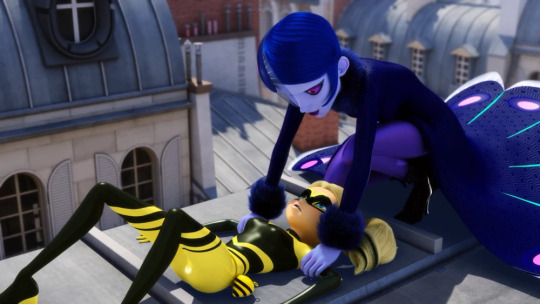
At first, it seems like Chloe’s doing well to refuse. Like she has a sense of justice. In truth, though, she’s mainly on Ladybug’s side because the heroes are usually seen as more powerful and cooler than the villains. There might be a sense of justice there, but that’s ultimately irrelevant to the core flaw that she needs to fix to become a better person.
And then, Heart Hunter and Miracle Queen. Ladybug doesn’t give her enough power, so she takes Hawkmoth’s side.
While Ladybug, Cat Noir and Ryuko fight Heart Hunter, Chloé becomes furious and throws her bee signal off of the roof, losing her hope. Hawk Moth comes and tries to convince Chloé to join him. Chloé is reluctant at first, because he is the one who akumatized her parents. Hawk Moth asks what Ladybug has done for her, since Chloé was the one who trusted Ladybug the most as a fan. Chloé finally agrees, but demands that Hawk Moth deakumatizes her parents first. Hawk Moth accepts these conditions.
This is the ultimate thing that reinforces the lie, that she is special and more powerful. The false character arc, that she just needs to learn to be nice, is thrown aside; she was nice to Ladybug, put herself on Ladybug’s side, and tried to work for justice, but it didn’t change that what she ultimately wanted, and felt was most important, was power, being special, status. The moment at the end of Heart Hunter is where she does her heel-turn, and now, what happens next?
Well, rememeber that she needs to learn she’s not special. As of now, she’s had the belief that she’s special reinforced, not weakened. It’s been reinforced as far as it can go. There is nothing she can do to believe she’s any more special than she believes she is. And now, being pissed at Ladybug, her false arc thrown aside, there’s no reason to try and act nice. It didn’t make her happy, after all.
So in Season 4, she doubles down on what she still believes matters: Power.
She’s worse to Sabrina, locking her in her closet, making her chase after the car, etc. She will only consider the best, most powerful friends like her: Zoe, her sister, has to be just as special, just as powerful.... and as we saw at the end of season 2, that means mean.
Which brings me to Zoe.
Zoe is important because she’s everything Chloe could’ve been if she’d already learned her lesson, for one. She’s successful at making friends because she cares about how nice someone is, not their status, which is what Chloe doesn’t get. She’s so frustated that Zoe makes friends at the end of Sole Crusher by just being nice. Chloe wants those friends, but everything in the show so far has taught her that power is important and it’s what will get her love and attention, and her power comes from, again, bullying and her dad.
And that’s also where Andre comes in. The other thing Zoe does is change Chloe’s biggest enabler- Andre. In Queen Banana, he refuses Chloe’s demands for the first time pretty much ever, and draws a hard line in the sand.
Suddenly, a little bit of Chloe’s power is taken away from her in that moment. She can’t understand how Zoe can be happier than her or why her father might tell her no. They’re incompatible with her worldview- that she is special, and powerful, and deserves things just for being special.
At this point, Chloe has to lose everything. She thinks that cruelty to others will make her happy; that demanding things gets her what she wants. It has, so far. So for her to change, that needs to not work. We’re seeing just the beginnings of that in Season 4 so far; she can’t demand anything from her father (although Queen Banana is full of demands she does get). Zoe didn’t find happiness through the method Chloe said she would in Sole Crusher (really, Sole Crusher lays out what Chloe’s been imagining the world is like the entire show. That’s it in a nutshell, really). Adrien told her she needed to be nicer and lowkey rejected her friendship at the end of Queen Banana. Zoe, the sister who is better off doing the opposite of what Chloe thought would make her happy and successful, took her symbol of power- the Bee Miraculous, her superhero identity- away from her. Chloe’s worldview is slowly unravelling as of Season 4.
So, what needs to happen next?
One: she will lose everything. Two: she’ll learn that power doesn’t make her happy. Three: she’ll realise that kindness and justice and equality, etc. are more important. Four: she’ll do something major to show that she understands this and has changed. Five: she’ll permanently stop putting herself above others.
I can’t project too far in the future, but what I can say is what is probably going to come next for the topic of her losing everything. Her father is going to say no more often; her mother will disappoint her; Zoe will continue to do well. Chloe may learn that Zoe is Vesperia, I’m not sure.
But the one main thing that I think, personally, Chloe needs to lose in some dramatic way is Sabrina. Sabrina is just about the last thing that has remained the same for Chloe so far. And I think that that change won’t come by Sabrina’s doing, necessarily. She’s not vengeful and doesn’t see or care about Chloe’s flaws.
But the thing is, it seems obvious by now that everyone in the class is getting a Miraculous. We’ve seen spoilers for Mylene’s and Juleka’s, and my personal opinion is that the four remaining unpaired Miraculous pair up to the three remaining classmates + the one other student who seems to recur (personal guesses: Ivan - Ox, Nathaniel - Rooster, Marc - Dog, Sabrina - Goat), but regardless, what I imagine would break Chloe’s existing worldview more than anything else, and leave it open to change, is Sabrina getting a Miraculous, and Chloe knowing it’s her.
Sabrina is Chloe’s trailing, forever-present symbol of power. She’s always got power over Sabrina. Sabrina being special in a way that Chloe no longer is, a way that got taken by her ‘lame’ sister who she views as less powerful than her, should put a lot into perspective for her.
In short: Chloe is going to have a bad time, and be a bad time, for most of this season, if not all of it. She’s got to learn that her worldview is wrong.
That’s how her character arc will end. That’s how we get a satisfying change, something meaningful happening to her, and her really changing from the bully she was. Miraculous is a lot more complicated than most kid’s shows and it didn’t simplify it down to ‘bully learns to be nice’- Chloe’s character arc is about changing the fundamental thing that made her so mean in the first place. It’s about learning that she is not at all exceptional, and that she is just like anyone else. And that she’ll prefer it that way.
#miraculous ladybug#ml#ladybug#miraculous chloe#chloe bourgeois#character analysis#miraculous analysis#i did not edit this it took too long to write#enjoy
55 notes
·
View notes
Text
Van Zieks - the Examination, Part 1
Warnings: SPOILERS for The Great Ace Attorney: Chronicles. Additional warning for racist sentiments uttered by fictional characters (and screencaps to show these sentiments).
Disclaimer: These posts are not meant to be taken as fact. Everything I'm outlining stems from my own views and experiences. I am a 30-something European woman, and therefore may not view the matter from certain angles. That said, I'm always open to more input from others. If you believe that I've missed or misinterpreted something, please let me know so I can edit the post accordingly. If we can make this a team effort, I would love that.
The purpose of these posts is an analysis, nothing more. Please do not come into these posts expecting me to either defend Barok van Zieks from haters, nor expecting me to encourage the hatred. I am of the firm belief that characters are no more than a tool created to serve a narrative purpose, therefore the question I'm posing is whether or not Barok van Zieks serves this purpose. That's all I'm doing here.
I'm using the Western release of The Great Ace Attorney Chronicles for these posts, but may refer to the original Japanese dialogue of Dai Gyakuten Saiban if needed to compare what's said. This also means I’m using the localized names and localized romanization of the names to stay consistent.
It doesn't matter one bit to me whether you like Barok van Zieks or dislike him. He's not real anyway, so he can't suffer from it. However, I will ask that everyone who comments refrains from attacking real, actual people. If you know you're morally in the right, there should be no need for insults to begin with. Let's keep this conversation civil and constructive!
As the first post in a series, let’s first start by examining the expectations we would have for a character like this. The purpose he was meant to serve.
1: Expectations
As I said in a different Barok-related essay, the main prosecutor of any Ace Attorney game has been, and always will be, an antagonistic force. Not a villain, not even necessarily someone who exhibits immoral traits. (Hi Klavier!) Just someone who impedes the protag’s goal of getting a not-guilty verdict. In order to have an effective antagonist, they need to mirror the protag's weaknesses back at them. Ace Attorney does this quite well, as the prosecutors represent the obstacle/turmoil that the defense needs to overcome. Often times, the prosecutor is also tied to a pivotal moment in the attorney's past, making sure the strife is quite personal.
Considering the game's plot and settings, it would've been difficult for Barok to be tied to Ryunosuke's past. (He is tied to Asogi's past, funnily enough, but that's a matter I also addressed in that other Barok essay.) So instead, Barok represents Ryunosuke's struggle in more of a figurehead capacity. I've seen people dub him the 'CEO of Racism', and I'm not gonna lie, in a way that's correct. Barok was designed to be the mouthpiece of the harmful sentiments Japanese exchange students would have encountered in the 1900s. By extension, since Ryunosuke is an exchange student unfamiliar with the British courts (or even courts in general), the prosecutor would target the fact that Ryunosuke 'does not understand how things are done here'. Which he does- a lot. This makes it all the more satisfying when Ryunosuke proves him wrong by outsmarting him and using Britain's own laws (such as the closing argument) against him. So yes, you may hate Barok for uttering racist sentiments and dismissing Ryunosuke's abilities, but the ultimate goal here is that Barok's defeat is made sweeter as a result. The narrative end-game is Ryunosuke's triumph and validation in the courtroom.
Was there a different personal struggle Barok could have represented? Yes, but also no. Sure, his vendetta could have been strictly with the Asogi family and Ryunosuke could have admitted to carrying Asogi's resolve, not knowing what it meant. Though that would’ve implied very early that Asogi had a history of sorts in Britain and would’ve destroyed some of the surprise we experience in game 2. Alternatively, there was also the 'parallel' antagonist angle. The sort of villain who says the line “we're not so different, you and I.” The antagonist who shows what happens when someone with the same skills or motivations follows the wrong path, which emphasizes the right path for the protagonist. However, I can't see that working in the plot of this game.
A purposeful decision was made by the writers to have prejudice be a central theme of the plot. This is the matter that hits the hardest in an emotional sense. Therefore, having Barok be the centerpiece of this prejudice ensures he leaves the biggest narrative impact.
---
However, another long-running aspect of the AA prosecutor is the redemption arc, so let's turn our attention to that!
I'm not going to put too much effort into explaining this, I just want to talk about the requirements of a redemption arc. We all know these types of arcs, a lot of Ace Attorney prosecutors have them. We see them in fiction all over. Noteworthy examples of redemption arcs done well include Zuko from The Last Airbender, Michael from The Good Place... For argument's sake, let's toss Edgeworth in there too. I'm not saying Edgeworth's arc is done well, but at the very least it is accepted by most as something that served its intended purpose. I've never seen anyone question Edgeworth's transformation.
See, what we have here is a bit of a misnomer when it comes to what people expect to get out of these types of arcs. Redemption in itself is only 'deliverance from sin' or 'being saved from evil'. It's the thought that a horrible person can still see the error of their ways before it's 'too late'. However, when it comes to absorbing media, often a character gaining knowledge that they were in the wrong isn't enough to satisfy the audience. Would Edgeworth have had a satisfying redemption arc if he'd acknowledged his arrogance and dirty tactics, only to retire as a prosecutor? No way. We needed him to return in the following games to give us an update on his status. Standing in court as a defense attorney, at the risk of damaging his reputation, was the moment we knew he'd grown for the better.
What we require for the arc to come to a good conclusion is atonement. The character in question must not only apologize for their actions, but repent in a more active manner to show that they've changed their ways. Following that, the atonement must be acknowledged by others. So for example, Zuko joins the ATLA gang to help them in any way that he can until even the most skeptical of the group, Katara, acknowledges his transformation into a better person. Now add to this the notion that the character's atonement must be virtuous and sincere. The Good Place is a fascinating look into the debate of 'is it ever too late for a person to change?' and the moral complications of changing in the first place. If you're only doing good things because you want to be saved from damnation, are you being a good person or are you being selfish? There's such a thing as corrupt motivation; only doing good because it is expected. For example, does sponsoring a library make Magnus McGilded a good person? It does not, since he's only doing it to boost his own reputation and have people believe he's selfless.
As a final note, I want to ask: Does a redemption arc require a backstory to justify the character's immoral ways? Personally, I don't think that it does. It's good to have, since it allows an audience to empathize with the character and give them more of a reason to root for them. It turns the redemption arc into a tale about overcoming past trauma. However, it can backfire when done badly and lead to frustration. (I'm looking at you, live action Disney movies!) Some characters are evil just for the sake of being evil and even then, they can turn over a new leaf because they realize it is just so much more rewarding to be good. Just look at Michael from The Good Place.
What's more effective than a backstory, in my opinion, is smaller details to humanize a character. Humanization can also lead to empathy, perhaps even relatability, and helps us believe that they're capable of change. We need to be told that a character has their own fears, their own flaws, their own odd little habits which deviate from the norm... Again, I'll point to Michael from The Good Place for this. Another humanization tactic, which we see employed often in Ace Attorney, is to display a prosecutor's likes and hobbies outside the courtroom. Edgeworth's fanboying over the Steel Samurai, Blackquill's love for birds, Nahyuta's willingness to stand in line for hours to get his hands on a delicious burger... I've feel ya, Nahyuta. This tactic is more readily employed in Ace Attorney because it's difficult to place a prosecutor in a position of weakness before the final showdown. You can show them tending to hobbies during Investigation segments, but you can't show them waking up from a nightmare or wondering whether their father loves them. Well, not until case 5 of that game, anyway. By then, it's too late to serve as the sole humanization factor.
Did Van Zieks need to be redeemed at all? The way I see it, the only correct answer is yes. What do we want to see in our world? Do we want people who hold racist prejudice to acknowledge their faults and become better, or do we want them to die clinging to their shitty moral compass? Do we want a world where everyone learns to get along, or do we want a world where people continue to be in the wrong and act like assholes until they inevitably get punished by law for something or another? Van Zieks needed to be redeemed in order to teach that valuable lesson that it’s never too late to be a good person and that it pays to be a good person.
So to summarize, what we needed from Barok van Zieks was the following:
1) Present an antagonistic (possibly immoral) force who personifies Ryunosuke's biggest personal obstacle/weakness, in this case racial prejudice.
2) Humanizing traits begin to show.
OPTIONAL: A backstory to justify any immorality he has.
3) Over time, Barok has his realization and sees the error of his ways.
4) Barok atones for his immorality, not simply through apology but by taking decisive steps.
5) The cast around him acknowledges his efforts and forgives him.
This leaves us with the question: Does the game deliver on these points? Well, let's boot it up and find out! Stay tuned for The Adventure of the Runaway Room! (as a warning, it’s gonna be LONG)
#dgs#dgs spoilers#tgaa#tgaa spoilers#barok van zieks#oh god here we go#i actually already finished Runaway Room but I need to let it sink in#it was a doozy
49 notes
·
View notes
Text
So, the Expanse finale made me very happy. It wasn’t perfect – there are a few shows of recent years which to me have had god-tier finales (Black Sails, The Leftovers, Crazy Ex Girlfriend, The Good Place) and if it wasn’t quite in that league, it’s partly because it felt like more of a pause than a true finale, with one problem resolved but the larger threat still very much out there. All the same, if we never get any more Expanse, I will be satisfied with this ending. More, spoilery thoughts below the cut:
Firstly, as everyone and their (strange) dog has said: there didn’t seem much point in the sub plot on Laconia unless they hope to get to tell this story later (or unless they just want everyone to read the books, which fair enough). I enjoyed the Laconia story, it was suitably creepy and reinforced the irony of the solar system tearing itself apart while a much greater threat awaits. But it was a bit of a weird choice to set up something that goes nowhere in the end.
As far as the main action is concerned, I loved how they resolved Marco’s storyline – disintegrated, defeated, wiped from existence. And I loved that it was Naomi who came up with the solution to defeat him, and I loved that – once again – it was an engineering solution, because the show doesn’t just see Naomi’s job as a line in a character bio, it’s integral to the way she thinks. Allowing Filip to escape, and Naomi never discovering that, the final speech where Naomi unknowingly explains why that doesn’t matter, was stunning and a perfect resolution. (And Dominique Tipper played all of that brilliantly, especially that harrowing and apparently improvised scream).
Also, how rare is it to see a fictional mother prioritise her own health and well being, and the welfare of others, over her child’s? Naomi loved Filip, did everything she could to save him, but when that became impossible, she not only walked away but chose her new family, and the greater good, over him. I’m struggling to think of another fictional example.
I was torn, in the lead up to the finale, between whether Naomi or Drummer should be the ultimate cause of Marco’s downfall. They both deserved it. In the end it was the right choice for it to be Naomi. I do wish Drummer had played a more integral role though – the Avasarala/Drummer scene in “Why We Fight” was iconic and will be one of those images which define the show for years, but ultimately her contribution to the fight didn’t make much difference. But she does end the show in a position of power. I do wish she had just taken it, rather than it being gifted to her by Holden. On the other hand, I did enjoy that one final moment of James “I just want a nap” Holden being horrified as he realises he's about to be landed with yet more unwanted power.
In the end, though, this is about the Rocinante and her crew, and the show left them all alive and in a good place (thankfully – I was sure Bobbie and Clarissa were goners there for a minute). The tensions between the crew in the early episodes were necessary, considering everything, but it was a joy to see the new, extended Roci crew come together as a family in the end.
I really liked how they handled Clarissa this season. I was not a fan of hers before, I admit, but this was a redemption arc done right for me – no big sacrifice, no demands for forgiveness, just Clarissa keeping her head down and doing the necessary, dirty work. And of course Naomi would respond to that. Not only is it, as she admits, what she wanted for Filip, but it’s also what she did herself after escaping from Marco the first time. So their reconciliation felt both real and earned.
For the record, though, Naomi had every right to be angry with Amos for bringing Clarissa on board without even consulting her, and I continue to be frustrated with those corners of fandom who seem to think Naomi isn’t allowed to have feelings.
Speaking of Naomi and Amos, I have always loved their relationship, and my first reaction to their moment of reconciliation was to wish for a little more. On reflection, I think what that scene was trying to say was that they no longer need each other as much, because of the growth on both sides, and that’s a beautiful place to leave them. And Amos being to Clarissa what Naomi was to him was a really powerful end for Amos.
If I had one other minor complaint, it is that I really wanted one final scene between Amos, Holden and Naomi – the surviving, original crew. But the show ended with the Roci still flying, heading out into the black, with her family together and happy. I can’t ask more than that. Good hunting, Rocinante. I’m going to miss you.
6 notes
·
View notes
Text
Why I don’t think Azula should’ve gotten a healing/redemption arc
k so I made this meme a couple weeks ago

and I got a lot (a lot? Like 10 but that’s a lot for me) responses disagreeing with my post, which is fair because there’s really only a tiny subset of fans who fit into the “if you stan villains you’re a bad person” category, and Azula’s character (like most other things in atla) is fairly nuanced. I won’t dive into her personal psychology so much, just why I was satisfied with her arc as a viewer.
Note: I’m only speaking within the context of Atla. I haven’t read any of the comics or seen Lok so for the sake of this lil post those don’t exist.
Not enough time
Plain and simple, Azula didn’t have enough time for any sort of healing or redemption. She would’ve needed at least 2 seasons based on what Zuko went through. Adding more seasons for this purpose would feel kind of pointless. Maybe they should’ve explored this in other media but not within atla as the story works best as a tidy three season bit.
Along this same vein, I’m not viewing the show the same way as I would irl. If we’re being realistic, Azula was a horribly abused mentally ill 14 year old who most definitely should’ve gotten treatment. But this is a cartoon, where standards are a little different, which I’ll talk more about in a minute.
Iroh used to be a bad person/If Zuko changed so could she
This one is more complicated for me, but basically I view it like this. In the show, Iroh and Zuko display goodness before their redemption.
We see this with Zuko especially. He is banished for trying to protect the lives of fire nation soldiers from certain death. Twice he spares the life of his rival Zhao, even after that rival tried to kill him. In season two, he saves appa, risks blowing his cover to light lanterns for Jin, saves a town from mercenaries, and even when he’s robbing, he spares certain people (the pregnant woman for example) and mostly targets the wealthy. Zuko, even at his worst, had hard limits on his morality.
Iroh is more subtle. The most clear example comes from the flashback in “Zuko Alone” where Iroh gifts Zuko a dagger from the earth kingdom that he notes is of superior craftsmanship. This, to me, shows where the start of Iroh’s arc comes from: his appreciation of the other nations. It’s been noted before that Iroh has also mastered all four elements, even though he can only firebend. Redirecting lightning comes from waterbenders- likely learned before Iroh “turned good”. Even as their adversary, Iroh respects the people of Ba Sing Se for their resilience. (This again contrasts Zhao, who was so deranged he murdered the fucking moon just to win.) Finally, the dragons. Iroh is known as the dragon of the west even to people from Ba Sing Se- this means that he spared the lives of the final dragons before Lu Tens death. Like Zuko, Iroh shows mercy even when on the wrong side. Lu Ten’s death breaks Iroh because it forces him to finally come to terms with the fact that the fire nation is built on a lie. Fire nation superiority is a lie, and it’s one he’s known for a long time.
Azula doesn’t display any of these traits. The only time in the entire series where she apologizes is after she insults Ty Lee, and I’d argue it was an act of manipulation, as she quickly uses the apology to receive praise from Ty Lee. The beach episode is the only soft side we ever see to Azula, and all of her interactions can still be interpreted like my example. Was the comment about Ursa thinking she was a monster a slip of her mask or an attempt to “perform” like the others? We know Azula is a liar, so was she lying when she said ursa was right, or that it still hurt? Or both? And, mind you, I do love how this episode explores azula more closely, but I don’t believe being a nuanced villain makes you a redeemable one. Even as a child, Azula is cruel and takes pleasure in hurting Zuko, and animals, and her friends. She’s a master manipulator who makes friends through fear and intimidation. Imo, the only reason she doesn’t actually kill someone is because Avatar was technically a kids show, though that sure as fuck didn’t stop her from threatening multiple peoples lives. There is no action of Azula that signifies an ounce of good in her.
She was abused
1) a tragic backstory isn’t the be all end all of whether or not a character’s redeemable, and 2) So was Zuko. And probably Iroh and Ozai, and probably Azulan. The fire nation royal family is fucked up. Even if Azulan was a “good” father to Ozai and Iroh he was still a dictator who was grooming them to take over.
Having Azula be a puppet in her fathers game was an incredibly mature route for atla to take. Once again, it adds depth with a realistic take for Azula’s villainy. Very rarely are individuals born evil (enter nature v nuture debate here). Some of the worst people to ever exist were victims of abuse and neglect to varying degrees. Once again, though, this doesn’t suddenly render Azula open to redemption. And from a storytelling perspective, there’s parallels between Ozai and Iroh and Azula and Zuko.
Ozai continued the cycle of abuse, Iroh broke free from it, Zuko ended it, and Azula was broken by it. These are all things that happen in real life.
She’s 14
Oddly enough this is the argument that baffles me the most. I know I just said a whole lot about real life vs fiction, but I’m gonna pull the fiction card on this one. I can suspend belief with these characters and their ages. I don’t think any 12 year old could function after waking up from a coma and finding out his entire people were slaughtered and that he only had like, six months to save the world, regardless of his upbringing and power set. I also don’t think any 14 year old could lead a trio to infiltrate a city state, outsmart the shadow leader of said city state, and manipulate and entire little army for her favor.
There’s just a point where you have to suspend belief. The characters of avatar are fantastic, but are not realistic portrayals of people in their age group. Azula could be 14 as easily as she could be 25 and nothing about the narrative would change. The same is true for the rest of the main characters- even Aang, as youthful and fun loving as he is, also has more emotional maturity than anyone in the gaang, and more than most adults i know. If you want a realistic example of a child working through trauma, try Lilo from Lilo and Stich. Not anyone from Atla
Not everyone needs a happy ending.
This is ultimately what it comes down to for me. I like Azula as a villain. I like Azula as a villain who stays a villain and who is driven insane by power and paranoia. I like Macbeth. Azula is a tragedy- and that’s what I like.
So there ya have it folks. That’s my take. I’m writing this at five am with very little sleep, so please forgive typos and whatnot. I feel like maybe I haven’t explained everything the way I wanted to, but I can’t stop thinking about this, and the great thing about this show is that it’s fun to keep thinking about.
#avatar#avatar the last airbender#azula meta#azula deserved better#atla azula#avatar zuko#iroh & zuko#uncle iroh#atla#atla spoilers#atla headcanons
433 notes
·
View notes
Text
The problematic conclusion of the Rise of Skywalker – a “whitewashing” of the Skywalker legacy ?
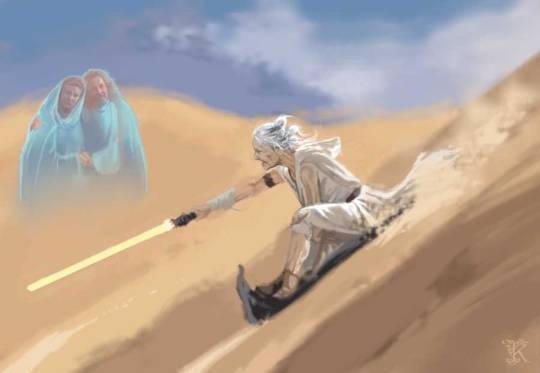
Art by kasiopea-star-wars
Nearly two months after The Rise of Skywalker came to theaters, I have finally found a way to express my throughts about the conclusion of this galactic journey. As a new Skywalker trilogy was announced years ago, I remember not feeling thrilled by the idea of a sequel, asking myself what would be the added-value to the story for an arc that started and ended with Anakin Skywalker. Yet I remember feeling pleasantly surprised by how promising The Force Awakens (TFA) was in introducing the characters, playing on their dynamics and setting up the family dramas : a stormtrooper taken away from his family ; a scavenger waiting for the return of her parents ; an heir rejecting his birth name ; a family desintegrated by a repeating tragedy. The Last Jedi (TLJ) felt refreshing by bringing the family drama to a higher level, deepening the heroine/antagonist dynamic and paving the way for a refined sight of the Jedi philosophy. As much The Rise of Skywalker (TROS) has its entertaining moments as a standalone, I couldn’t help feeling growingly unconfortable about this movie as a conclusion of the Skywalker story.
Why Return of the Jedi (ROTJ) originally felt like a satisfying conclusion of the Skywalker story…
Among the several reasons why TROS fails to deliver a satisfying conclusion to this 42 years old arc, the very last act of the franchise stands out as strangely dissonant with the rest of the entire story. Let’s have a look back at the original ending set up by Return of the Jedi (ROTJ). Far from being my favorite Star Wars movie because of the Jabba the Hutt sequence, ROTJ never failed to get me emotional by the way it beautifully concluded the Skywalker arc. Beyond the joyful atmosphere around the galaxy and the celebration of the victory on Endor, the last sequence sets up a powerfully emotional ending because it’s all about healing the wounds through reconciliation : reconciliation of a man with himself, reconciliation of a father with his son but also reconciliation of a fallen Jedi with the old friends he once betrayed. Thus, as sad as Anakin Skywalker’s death may be, the outcome of his tragic life is counterbalanced by what we get to experience on screen with the characters, from his funeral scene to the appearance of the Force Ghosts. Everything is synchronized in a way that enables the viewer to feel that the hero of the OT, Luke Skywalker, has now completed his journey to find himself, can let the past behind him and move on to build a brighter future surrounded by his « family ». At that point, this conclusion left me as the viewer with the satisfying feeling that the Skywalker arc is complete, bringing me back to my initial question : what was their story worth to continue for ?
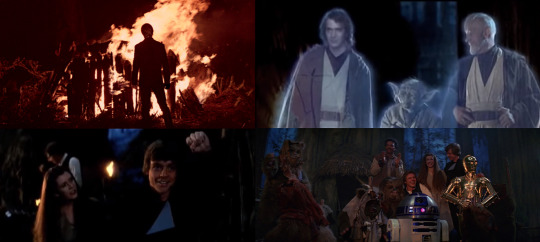
…that left the Skywalkers with an unresolved family business
Yet, when we meet the Skywalkers again 30 years later, it appears that the family has completely imploded : a fallen son enrolled in the ennemy camp, the parents separated, the uncle exiled on a planet far far away. TFA introduces the viewer to a family tragedy that repeated itself with a kid targeted by a master puppet for his “mighty blood” in order to follow his grandfather’s footsteps. We learn from the canon novel Bloodline as well as TFA make it clear that neither Leia nor Han ever forgave Vader and very much feared that their only son would take after him: “We’ve done everything we could have done. There’s too much Vader in him”. As impressive as his sacrifice might have been for a 1983 viewer, Vader’s redemption was the result of a sudden turn for the sake of one person, an action that neither Leia nor the Galaxy got to witness, making Anakin only an unsung hero of the victory against the Empire. His sacrifice didn’t enable any reconciliation of his daughter with the dark side of his legacy, paving the way for the tragedy to repeat with his own grandson. As unsettling as Luke’s characterization may have been in TLJ, the attempt to kill his own nephew in his sleep suggest that he probably wasn’t as reconciled with his father’s legacy as he thought. In other words, the wound healing through reconciliation set up in ROTJ was uncomplete and left door open for the tragedy to repeat, which leads to consider the importance of Ben in the sequel trilogy of a family arc that has been told over 42 years in 9 episodes :
- A son who witnessed his slave mother dying in his arms
- A mother who died in childbirth from a broken heart
- Husbands and wives who losed their respective partners
- Parents who lose their daughter
- Kids who got separated from their parents
- A nephew who witnessed his adoptive parents getting killed
- Fathers who died sacrifying for their sons
- An uncle who died apologizing to his nephew
- A son who lose his mother after she sacrificed for him

"As I once fell, so falls the last Skywalker”
Named after Ben – “You’re my only hope” – Kenobi, Ben Solo represented the hope that at least a Skywalker could finally make it through darkness. He was not just the only descendant of the Skywalker family. He was also the bearer of all the abuse, pain and tragedies that this family has been through since his grandfather himself was targeted by their sworn ennemy: Palpatine. Thus, he is the recipient of all the wounds that didn’t heal properly within the family, making his manipulation by Palpatine, his feeling of rejection by his parents and the murder attempt by his uncle all the more tragic. The fact that Ben – and the Galaxy – was kept ignorant of the family connection with Vader certainly didn’t help, making him from early age an ideal target for the revenge of Palpatine: “I have been every voice you have ever heard inside your head”. People may argue that the outcome is okay since there will be no Skywalker descendant for the tragedy to repeat one day and that Rey will ensure that their legacy lives on by carry on the name. That Rey deserves to be part of the Skywalker legacy through her personal achievements is unquestionable. However, she is not the bearer of the tragedy that has plagued the Skywalker family for the viewers to witness over 9 episodes. Although her backstory is heartbreaking to say the least, TROS doesn’t let the viewers time to feel the depth of her own tragedy adding to the fact that we didn’t get to relate to the tragedy of the Palpatine family over long-run. Even if Rey shoudn’t be reduced to her bloodline (which was the risk of making her a Palpatine through), didn’t Palpatine achieve what he wanted in the end ? People may argue he lose since his own granddaughter will carry on the Skywalker name as a Jedi. However, if his personal revenge against the Skywalkers was to end their bloodline, then he definitely got what he wanted after being the cause of most of their tragedies:
- He predicted Padme’s death, which he brought Anakin to provoke
- He wanted Anakin’s death, which happened through his sacrifice for Luke
- He wanted Han’s death, which he brough Kylo to provoke
- He wanted Luke’s death, which indirectly happened through his sacrifice
- He wanted Leia’s death, which happened through her sacrifice for Ben
- He wanted Ben’s death, which happened through his sacrifice for Rey

The problematic execution of Ben Solo’s redemption
From the moment TFA had Ben Solo aka Kylo Ren commit a parricide, the question of his redemption was at the heart of his character arc. Beyond the passionate discussion about whether or not he should have lived given his dark actions, it’s the way he was treated in the last act that doesn’t feel right put in the bigger context of the story. It is legitimate that Rey was the one person to ultimately take down Palpatine, all the more so that she is revealed to be a Palpatine descendant. Yet, the role in which Ben Solo was relegated during the final battle on Exegol doesn’t feel right within the framework of the entire arc. The Skywalker descendant – as bearer of the family tragedy – got to stand barely 5 seconds against the abuser of his family, only for his body to be used as a mean to resurrect Palpatines, grandfather and granddaughter. Worse : the entire set up for the Force dyad in the ST was made useful for that sole purpose : draining the Force energy of the Skywalker to death so that the Palpatines could live on. Even if the last Skywalker was meant to die anyway, why giving him the same redemption as his grandfather, knowing that this redemption path only reconciled one person – Luke – with the dark side of the Skywalker legacy? Why having him sacrifice for the sake of only one person instead of putting him in front of a dilemma that would have required to overcome the evil voices once and for all for the greater good of the Galaxy? Why having no witness of his ultimate inner struggle instead of letting the Galaxy finally know what was behind the darkness of both Skywalkers grandfather and grandson ? I am aware that this is easy to critisize directing choices once the movie is out but based on all what was demonstrated above I believe that the Skywalker family would have deserved that their only descendant had a more active part in overcoming their abuser once and for all by overcoming the darkness he planted in them. In my ideal scenario, Rey would have taken down Palpatine all alone in her badass way all alone but there would have been an ultimate twist. The remaining fleet would have been programmed by Palpatine to execute the last order, from a signal sent from a dark artifact on Exegol for all the Galaxy to witness in horror. The only way for someone to desactivate it would have required to overcome his/her darkest struggles within, which would have been a meaningful way to confront Ben with his family tragedy, the dark legacy of his grandfather and his own dark actions. I would have loved the idea that the evil voices put him in front of a dilemma and that his grandfather finally helped him to take the right decision based on his own fateful experience: choosing between saving a loved one from her death state or saving planets from destruction for the greater good. There were several meaningful scenes that could have foreshadowed this kind of scenario. Instead, TROS gave us the same redemption as ROTJ :
- A short-term redemption path
- A sacrifice for the sake of one person
- No witness of the good action other than said person
Yet, disappearing to never be seen, mourned or mentioned ever again...

A whitewashing of the Skywalker legacy
The ending scene of the Skywalker franchise takes place on Tatooine with Rey burrying the Skywalker lightsabers in the sand as a funeral, which is meant to enable her – and the viewer – to move on peacefully. According to Lucasfilm VFX supervisor Roger Guyett and screenwriter Chris Terrio, no Force ghost of Ben was created because “when you see Luke and Leia there, it’s about the Skywalker legacy”. For a movie that was supposed to tie all 9 movies together, the Prequel Trilogy (PT) doesn’t seem to exist as if the Skywalker story began with the Original Trilogy (OT). We get to see Cloud City and Endor after the final victory but no shot of Coruscant & Naboo. The family tragedy begun with the separation of the twin but the grooming of their father and the death of their mother doesn’t seem to be part of the traged. The Skywalker lightsaber is primarily presented as Luke’s lightsaber as if he was its original owner. What is canonly established through is that the Skywalker story began with a slave boy named Anakin Skywalker who was believed by the Jedi to be the Chosen One, which made him the target of a Sith named Palpatine, which led to a long-run family drama in the middle of a never-ending battle between the dark side and the light side. Given the importance of his fall to the story and how it fed the family drama beyond his death, his absence in the sequel trilogy is surprising, aside from a very discreet line to Rey : “Bring Balance as I did”. Shouldn’t Anakin have guided his fallen grandson too instead of helping only the granddaughter of his sworn ennemy ? More problematic is the way the family drama is resolved with the ending of TROS. While the family was split at the beginning of the ST, TROS doesn’t care to show the healing of the family wounds, except for the memory scene between Solo father and son. The reason why this scene is the most powerfully emotional moment of the movie in my mind is precisely for its ability to symbolize the reconciliation of a man with himself and a son with his father. Yet, the ending scene is only about reuniting the all in the white Holy Skywalkers who have never “sinned”, giving the unconfortable impression that the Skywalker descendant was disposable because he wasn’t worthy to have any place in the Skywalker legacy contrary to the heroine. After all, the original script of Duel of the Fates by Colin Trevorrow had Luke telling his nephew “You are no Skywalker”, as if the Skywalker legacy wasn’t made of both darkness and light and Luke himself didn’t contribute to this with his own mistakes. Although TROS is more subtle in its approach, the difference in the handling between Anakin Skywalker and Ben Solo’s redemption after their death is telling: kept a guarded secret by the person he saved; not even mourned by the only person he bonded with; not even shown alongside his family. Dead or alive, his treatment on screen left me as a viewer with the unconfortable feeling that the Skywalker family as a whole wasn’t reconciled with the dark side of their legacy. Which brings me once again to the same question: what was their story worth to continue for?
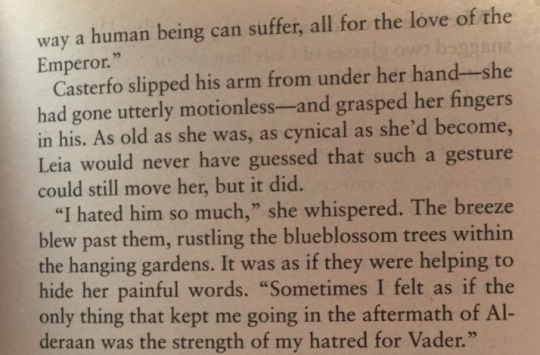
Excerpt of the canon novel Bloodline
The purification of the heroine
Let’s talk now about how Rey ends her heroine’s journey compared to where she began. That journey was announced by Maz Kanata already in TFA: “The belonging (family) you seek is not behind you (birth family), it is ahead (found future)”. She was introduced as desperate to find a place to belong because of her feeling of loneliness, which never incapacitated her ability to be a strong independant woman who knows how to handle herself. Yet, her heroine journey alone on Tatooine where she takes the Skywalker name looking at the Binary Sunset under the watchful eye of the Skywalker Twins as Force Ghosts. Some may argue that she will be okay since she found a family in them and her Resistance friends, which is true to some degree but uncomplete through. However, the ending looks out of place with a key character missing in this scene, whether he was supposed to be dead or alive: Ben. Although it was important to show in TROS that Rey was well surrounded by a supportive entourage (as a constrast to Ben before his fall), the ST established that the deepest emotional connection she had was with Kylo Ren/Rey. I wouldn’t allow myself to judge those who find Reylo abusive and/or questionable because of his actions but I personally don’t think that the outcome of TROS is a feminist as it was meant to appear by having the heroine as a strong independant woman free from any romantic involvement . The ST makes it clear all along that although Rey obviously suffers from abandonment issue, she is more than capable of handling herself, know by herself what is right or not and decide conciously what (who) she wants for herself. Some people may disaprove the very idea of “Reylo” for valid reason but claiming that the kiss came out of nowhere doesn’t make sense when one look closely at their interactions all along the ST. TLJ shows that the hand touch she initiated is the decisive moment where she gets to see what the viewer finally get to see only at the end of TROS : the true face of Ben Solo, without the mask named Kylo Ren behind which he hid himself. From this moment on, my understanding is that Rey perfectly knew how to dissociate the person from his persona, thus her disenchantment in the Throne Room while confronted to his unwillingness to let go of his dark persona. With Rey shutting the door of the Millenium Falcon to his face, TROS could have made their dynamic an unrequited villainous crush afterwards. Although this is what it looks on the surface, the visual subtext tells a different story, which is a huge reason that makes their interactions so compelling to analyze. On Pasaana, Rey is shown staring longingly at little kids, sadly confessing that she has no family (despite living with the Resistance and her friends for a while) and being in deep thought at that moment. Barely 2 seconds after enter her dyad to renew his hand proposal. Of course, different interpretations can be made about this scene. I would argue that the chain of events in a matter ofminutes is meant to convey a specific message if one accept the idea that the hand proposal is metaphorically a marriage proposal. The ST sets the record straight through that despite her attraction to him Rey always rejected Kylo Ren and his entitled behavior while making heart eyes to Ben Solo and the selfless person she knew he was deep inside through their bond. The core of their unresolved business in TROS is all about him being desperate to know why she wanted to take his hand while being frustrated by her refusal to acknowledge it and her being desperate to hide the reason why she didn’t take it while being frustrated by his refusal to acknowledge who he really is. Both lied to themselves and each other out of fear of being rejected and disentchanted again. Thus, the tension rising until a confession that changed everything : “I wanted to take your hand, Ben’s hand”. Rey chose consciously to kiss Ben only once she was sure that the mask had definitely dropped and he had renounced to be someone else than who he really is. Although Kylo Ren was chasing Rey, she was always the one who set the rules and initiated willingly any further step in their relationship and only when she felt he was his true self with her. This teaches an important lesson – especially to teenage boys – that you don’t earn the feelings of someone (no matter what feelings he/she has for you) by hiding yourself behind a virile persona and/or showing off toxic behaviors in order to impress said person. In other words, the love triangle was always between Rey, Kylo Ren and Ben Solo from a female gaze perspective: it’s Ben who was presented as “object” of desire all along. Yet, the choice that Rey willingly makes – and the desire that goes along with it – is taken away from her as if it was decided at her place that Ben Solo was never the right partner for her anyway. After three movie setting up that the heart of her emotional journey was with him, the fact that he is totally erased from screen after – and despite – their love scene looks like a puritan attempt to purify the heroine from the sin she has committed. Worse, she ends her journey where she began: on a desolated sand planet, sliding innocently the dunes, wearing the same all white costume and an adopted child under parental watch. In a nutshell: pretty much like Luke at the beginning of his hero’s journey.
Rian Johnson: “ The hand touch is the closest thing we’ll get to a sex scene in Star Wars”
Luke Skywalker (deleted line): “You’ve opened yourself to the dark side for a pair of pretty eyes”

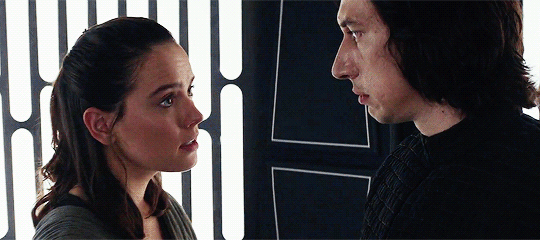

Tatooine: an iconic place...of desolation
Although Tatooine may appear as a logical choice for the ending scene, the intention to recreate the atmosphere of the iconic scene from ANH falls flat in the context of TROS but also in the context of the whole franchise. According to Chris Terrio, the point was to fix the original sin of the franchise, which was the separation of the Twins by tying the lightsabers together like newborns. Did it make sense through to burry them on Tatooine ? Based on the Prequels, the Skywalker/ Palpatine arc has its roots on Naboo, when a Queen was forced to flee in order to meet the Senate representative of her home planet on Coruscant but met a slave boy from Tatooine on her way. Naboo may have been a less iconic choice for fanservice but in regard to the heartbeat of the Skywalker story, this is where Anakin and Padme’s love story blossomed, where Padme planned to give birth to their babies, where she is now resting forever: “Ani I wanna have our baby back home on Naboo”. Wasn’t the original sin that these kids were separated from their parents and all of them never got reunited ? Yet, Padme’s babies - and her husband by extension - were metaphorically burried on the very planet where Luke was never supposed to end up had the family tragedy not happened, where his father grew up as a slave, where his grandmother had a painful death, where his adoptive parents were murdered, where his sister was enslaved, where his brother in law was imprisoned, where he himself never wanted to return. Yet this is also this place that was chosen to end Rey’s heroine journey. She ends up being the spiritual heir of the Twins, especially the Jedi that Leia would have become by her brother’s side had she not chosen romantic attachment over that path. In general, the ending sends the message that romantic love and children only cause destruction while preventing parents from achieving their ambitions. Padme and Anakin’s love created destruction through the immiment birth of the Twins ; Han and Leia’s love created destruction through Ben’s upbringing, only to have their sacrifice rewarded with his death and his sidelining of the legacy. Terrible message for teenagers that no matter the selfless acts you do, you still deserve to be forgotten or even replaced with someone more worthy if you lose yourself following the wrong way because you were a problem from the start. On a sidenote, DLF probably failed to get people invested in the new characters, precisely because most of the characters and their interactions turned out to feel superficial, interchangeable and disposable on the long run. Jahnnah was introduced to Lando in the very end for no particular reason, except maybe baiting the fans with future added-materials about a potential father/daughter dynamic. Finn and Rose kissed in TLJ? Let’s have her sidelined, Finn friendly tapping her shoulder, telling her to stay away and choosing the company of someone else in the next film. Zorii asked Poe to come with her? Let’s have her refusing to be with him, barely hours after their conversation. Rey and Ben kissed before he died? Let’s have her flying out of Exegol with fanfare, happily reuniting with her friends and paying tribute to the Twins without showing an once of interest in the fate of her dyad. In general, the movie leaves the feeling that there is no deep sense of belonging for anybody and that they all are pretty alone despite forming a big "family" of friends on the surface. The ending feels even more out of place knowing that Rey’s journey was never meant to parallel Luke’s, who only wanted to become a Jedi like his father and ultimately became one. It was never the motivator of Rey’s journey to fight for a higher cause by becoming a Rebel or a Jedi in to follow the footsteps of a loved one and/or a mentor. Yes, she accomplished great things and it is absolutely right to enable her to fulfill any ambition she wishes to accomplish in the future. However, it is not because she had simple human needs too that they were unimportant and meant to diminish her character. Let’s go back again to this Pasaana scene where we are reminded of the core of her heroine’s journey: “The belonging you seek is not behind you, it is ahead”. Of course, that could be interpreted in retrospect as a foreshadowing that she will take a new generation of Jedi as Rey Skywalker continuing the legacy of Luke. But again, the directing choices suggest otherwise: why showing her staring at 1-2 years old babies instead of 9-10 years old kids? Why suggesting that she may not have a family at that point but that she will have this possibility at the end of her journey? More important: why suggesting through the hand proposal that Ben Solo is the one through with she is meant to have a family ? Although her thoughts ain’t explicit, the chain of events suggests an underlying desire: marriage proposal, forming a family, having babies. Yet, Ben and Rey finally coming together resulted in a kiss of death and her ending like a virginal nun metaphorically burrying the kids she’ll never have with him. Terrible message for girls from a female gaze perspective that no matter how heroic she was and all the harships she went through, she is not allowed to get the belonging she chose willingly (contrary to most male heroes). Terrible message in general that the wants openly expressed by women never really come true in Star Wars: Padme never got her babies back home on Naboo; Leia never got her son back home alive; Rey never got the home she really wished for with Ben. Even if Ben was meant to die like Jack Dawson from Titanic (given the few parallels used by TROS), his total absence after his death feels incredibly wrong, especially given how the only person whom with he bonded emotionally appears indifferent on screen to his fate. This closure on Tatooine without him rubs the viewer from witnessing the definitive healing of the family wounds but also from the feeling that the heroine can move on peacefully with her life: fulfilling her goals, being surrounded with her friends and why not raising a family until she’ll be ultimately reunited with Skywalkers in death. Thus, a tragic ending like Titanic where you are aware as a viewer that Jack and Rose technically can’t be reunited in the afterlife feels strangely more uplifting than the ending of TROS where it’s technically possible that Ben and Rey get reunited someday. What is shown on screen is what remains enshrined in the mind of the viewer. An ending scene on Naboo with Ben (alive or dead) would have given a different vibe, reuniting metaphorically all Skywalkers (except Shmi Skywalker-Lars) in the same tombstone and symbolizing the family reconciliation: a husband with his wife; parents with their twins; a nephew with his uncle; a son with his mother ; a father living in his son’s heart since his death. Beyond that, what more meaningful message for Rey Palpatine than choosing the Skywalkers on the very planet where her own grandfather came from like Padme and began tormenting the Galaxy and her family ? Alas, the conclusion of the franchise shows the heroine ending her journey alone on a desert planet, her birth family dead, her found family decimated, without her lover and her friends to be seen, surrounded by robots and ghosts…but with a cool name as consolation prize!
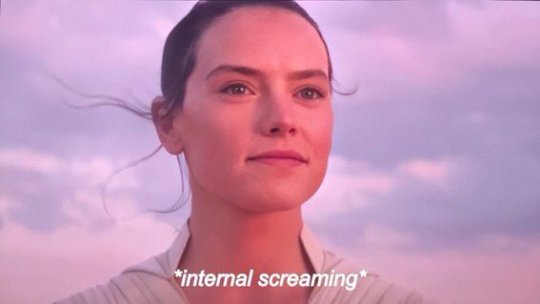
670 notes
·
View notes
Note
I saw many people tweeted that Chloe is not deserved the threatment she received in the show (i.e being her miraculous taken from her, being bashed, etc), she helps lb selflessly only for lb to take her only way to redeem herself, to show she can be better person and the only reason why she's treated badly is because Thomas hate her, that's why he refused to give her a redemption arc and instead keep calling her a villain. What do you think of it? And what do you think of Chloe as a character?
I’ll come off clean right away. I too believed in Chloé. I too hoped for her to get better and gave her a chance. Was I disappointed by the turn she took? Yes. Just like Ladybug and Chat Noir too were disappointed I’m sure. Was I surprised by this development though? No.
It all comes down to 3 things that lead Chloé’s development to this result.
Chloé’s traits and motivations.
What the Bee Miraculous represented to Chloé
Chloé’s trust toward Ladybug
Let’s go back to the beginning of Chloé’s development. Despair Bear. Chloé is forced to make an effort and be nicer otherwise she will lose Adrien’s friendship.
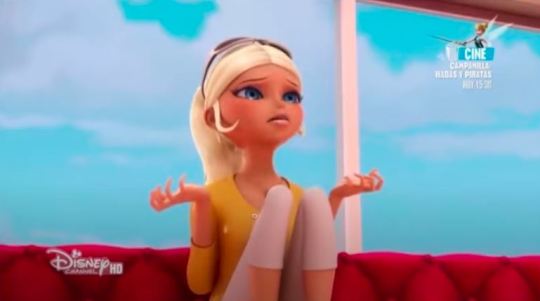
Chloé : How can [Adrien] do this to me, Jean-Michel?
She doesn’t understand why she has this ultimatum. She isn’t reflecting on her actions. She just want Adrien to be her friend again. With the help of her butler though, Chloé works her way through. It’s a bumpy road and she obviously doesn’t like doing this. At. All. She always questions the point of this nice action or that other one, but she forces herself only not to lose Adrien’s friendship which obviously means a lot to her, but she finds this whole experience is annoying.
During the Akuma attack though, she does rescue Ladybug from being Catalysmed by a Chat Noir controlled by Despair Bear, but what does Chloé say immediately after she has realized she had been actually helpful for once?

LB : Thanks, Chloé
Chloé : Hey! I was really nice just then! Did you see? No?
She boasts about her actions, wanting people to notice her. The whole audience doing the Anime Fall™ illustrates that boasting about being nice defeat the initial purpose. Doing nice actions should be because it is the right and natural thing to do, not to expect glory and reward afterward, even if Chloé instinctively wanted to protect someone she deeply idolizes.
After helping Ladybug out to defeat Despair Bear, Chloé realizes there are some benefits to being nice, yes, but what does Chloé do after showing she is capable of making an effort and secured back Adrien’s friendship? She sighs of relief, a burden lift out of her shoulders, and reverts back to her usual self.
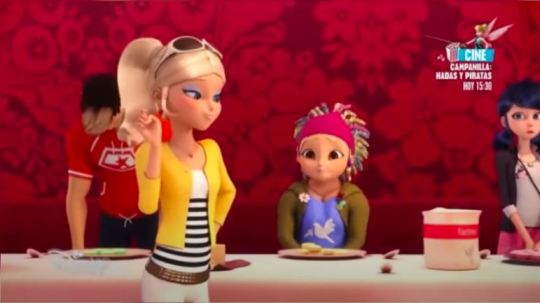
Now I know people will say “It’s just to maintain the statu quo”. But when you look back at this episode after Miracle Queen or even after Miraculer, you realize Despair Bear had a lesson in it that concerns people like Chloé. That is they can make an effort to be nicer and can sometimes be helpful but if they don’t want to become a better person, to be kinder to others, then they won’t change.
Over S2, we see Chloé under a new light. She isn’t just a spoiled rich bully. She is human too. When she is hurt, she hurts back. Marinette -- and by extension the viewers -- learns to see that side of Chloé and empathizes with her. But while it explains it, her snobbish, mean and entitled attitude still isn’t acceptable. Not when living in society.
But Chloé does make some some progress through S2. Small. But still, progress. Like during Zombizou, where Chloé admits for the first time her actions has hurt people.
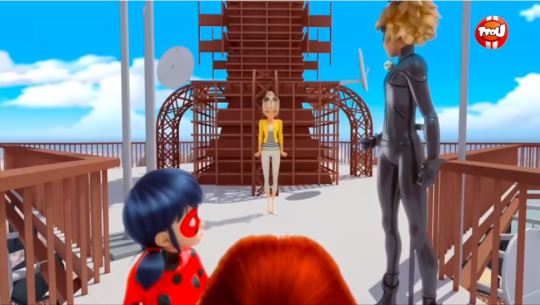
Or the end of Queen Wasp where Chloé finally accepts to give back the Bee Miraculous she had found to Ladybug, admitting she had been irresponsible with how to use that power.
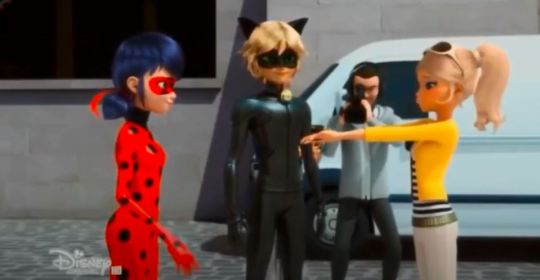
Or during Malediktator, when Chloé opens up to Ladybug, telling her the truth and how useless she feels.
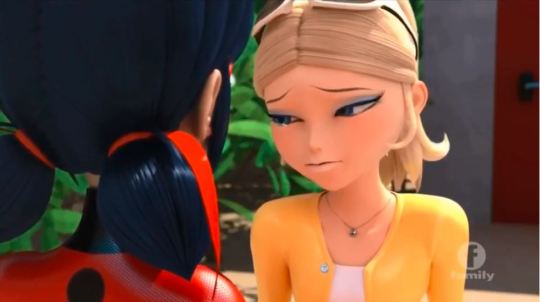
That was a start. Chloé showed us she was capable of doing that when renouncing or not expecting to have a Miraculous. However, after Queen Bee is officially recognized as one of Ladybug’s allies, something else happened.
After actually saving Paris during Malediktaor, Chloé got a party celebrating Queen Bee, celebrating her.
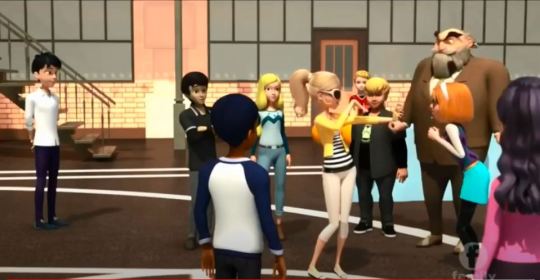
Marinette was trying to do some positive reinforcement to encourage Chloé.
Marinette : Well, she did save Paris, so... maybe she just may be able to save herself too, am I right? [...] If she feels like she can be useful, I’m sure she’ll change her attitude.
“[Chloé] just may be able to save herself”
It isn’t Ladybug’s responsibility to change Chloé so she could become a better person, but Chloé’s. Ladybug can help her a bit, by showing support and guiding her, but it is ultimately Chloé who has to work on herself in order to save herself AKA to begin redeeming herself if she wants to. Like how Chloé desired to save her dad and fix her mistake. However, Chloé’s secret identity being publicly known has jeopardized that process.
Look at the ending of Malediktator. Chloé has a party but instead of taking pics with her and the crowd, or with people she cherishes or is thankful about, what do we get?

A selfie of her with her with no one else around her posted on her social media, showing us her self-centred image.
This behaviour repeats itself during Heroes Day as well. Everyone has prepared a nice action for the day and what was Chloé’s? Accepting to sign autographs since now she is a superhero.
And at the end of the finale, yes, she is included in the group picnic, but how is she staged on the set?

She sits on a lounge chair, not directly touching the ground where everybody else is sitting. She refuses to eat home-made meals, preferring fancy sushis. And finally, she has her butler break apart her chopsticks for her, without even politely asking him by looking him in the eyes.
What does this scene tells the audience compare to the scene where Chloé is dismantling her Bee “Lair” without any help at the end of Malediktator, telling her butler she’ll do it because she has to do this herself. (Translation : I have to fix that error of mine myself”).
As S2 concluded, since Queen Bee is now officially one’s of Ladybug superhero teammates and that everyone knows QB is Chloé, she feels above everyone else, refusing to sit at the same level as them. She still doesn’t care about others’ feelings. She expects people to serve her. Even her “benevolent” action of signing autographs for Heroes Day revolved more around herself than acutally helping others.
This is where Chloé’s character stands. This is what she values. Herself. Her needs. She feels morally superior. She has ascended to greater heights. She acts entitled because Ladybug has trusted her with a Miraculous once or twice. And it is this attitude Chloé never tries to fix and that has lead her to her descent.

The people who are mad about Chloé’s development throughout S3 often misinterpret the real reason why Chloé constantly wanted to be Queen Bee to begin with. What the Bee Miraculous truly represented to her.
Chloé didn’t want to be a superhero because she wanted to help people nor was it because she felt bad about how awful she had been to everyone in general and wanted to make amends. Chloé didn’t need a Miraculous for that. She could have accomplished that progress simply as a civilian if she had wanted to.
It wasn’t because Chloé still had something to prove to her mother either. That was settled at the end of Queen Wasp. Her mother had acknowledged her and was staying in Paris, with her. Audrey finally gave the recognition Chloé longed for. (Though I admit “you are exceptionally mean like your mother” is a shitty reason, but hey! At least Chloé got her mother’s attention and love now, so little yeah...?) And in Malediktator, we see Audrey taking Chloé’s side, agreeing they should leave for New York together.
As for wanting to be loved by others, Chloé has already the affection and attention from other people such as her butler, Sabrina, Ms Bustier, and even her father who overly spoils her, satisfying every of Chloé’s desires. They were there for her even before she got her hand on a Miraculous. And it wasn’t because Chloé wanted the power to protect the people she cared about either nor was it her symbol for a second chance.

No, Chloé only cared about herself and the reason why she wanted to be Queen Bee everytime she could is because, to her, having a Miraculous means you are part of the elites.
Miraculous Holders are chosen ones. Litterally! There are only a few select of them. They get to be famous, glorified, celebrated (Heroes Day). They get movies made about them (Animaestro). They get to be on the news, interviewed. To have their image show everywhere. To have fans. To be adulated, respected, listened to. They are exceptional. Superior.
And this isn’t new with Chloé. Ever since S1, fame and status has always been a motivator for her to do things. To be exceptional. Not just to be seen by her mother (though it started it like that), but for everyone to see it.
In fact, when there is an Akuma attack, is Chloé helping others around her or is she abandoning everyone and heading straight to light her bee signal while buzzing with excitement? Does she stay steady just in case Ladybug needs her or is she expecting Ladybug to ask for QB’s help every time? Is Chloé resilient about QB not being needed all the time or frustrated to sit on the bench? What does Chloé do to fix this? Does she give herself a purpose as a civilian or does she cling even more to Ladybug to bring her the Bee Miraculous?
Basically when Chloé is offering her help, in reality, she just want to be a superhero for the glory of it rather than actually caring for or helping people around her.
When Chloé asks for “her” Miraculous and constantly clinging for Ladybug to give it to her, it means she only sees value when she is Queen Bee. And when Queen Bee wants to be reliable to Ladybug or fears to disappoint her idol, ultimately, Chloé wants to not screw her chances to be Queen Bee again.
Thus, yes, Queen Bee does her part when battling Akumas, but does Chloé actually grow as a person after Malediktator events? Did Chloé work on herself? Does she continue reflecting on her actions? Does Chloé even sometimes try to help her classmates with their normal problems or is she resting on her laurels? How does she treat others in general? Did Chloé truly become kinder or humbler or did she instead got the big head and still is rude to them? Does she views herself as a normal person or as a superior being? If you are unsure about any of the answers, just rewatch Startrain.
Chloé just stops improving because she took her Miraculous for granted. She is an hero recognized by Paris and therefore deserve the hero treatment and doesn’t need to continue to work on herself.
Sure, Chloé isn’t provoking as much akumatization as in S1 and S2, but she didn’t become better either by receiving a Miraculous. In fact, she is even more condescending. She is Queen Bee, she is a superhero thus she is better than you, peasants!
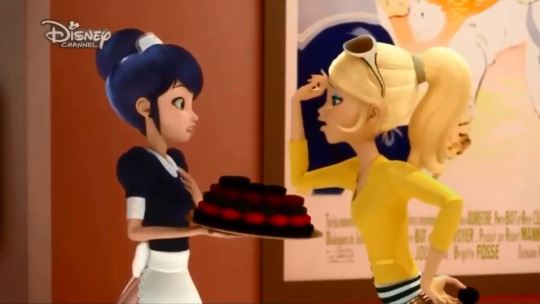
Chloé : In this world, there are those who work and those who shine. Forever there would be this division between us, Dupain-Cheng.
And this mentality contributed to Chloé’s sense of entitlement to the Bee Miraculous, calling it hers and expecting to have it back as if it was her rightful right. Except Miraculouses belong to no one as illustrated by the Turtle Miraculous who gets shared between Master Fu and Nino. And initially, LB wanted to hand over the Bee Miraculous to Alya because LB needed help and Alya had already been trusted with another Miraculous before.

Anyway, during Heroes Day, it was part of Scarlet Moth’s plan to use the Bourgeois against Queen Bee. To destabilize her and it worked. And if he could do it once, he could attempt something again.
And this is what motivated Ladybug to be careful and ideally not give back a Miraculous to anyone who’s secret identity is known by Hawkmoth. And for the record, yes, Chloé is the first one truly affected by that rule, but she isn’t the only one through S3.
This decision is made by LB with CN’s approval because they wanted to protect Chloé and her loved ones from HM. And unbestknown to them, their doubts were found as Chloé was being watched over by HM and Mayura.

So it wasn’t because Queen Bee was doing a poor job, nor because Chloé's attitude was getting worse. This was done to protect her. Except they couldn’t protect Chloé from herself.
Yes, Ladybug did a mistake which is to not inform Chloé of this decision earlier. As a result, in Miraculer, Chloé felt ignored. Rena Rouge and Carapace were often called to help while Chloé was standing there waiting next to her bee signal.
But even if LB had told Chloé sooner, chances are the result would have been mostly the same. Because Chloé has an inaptitude to let go of things she desires.
After learning the truth, Chloé was clearly not satisfied by this decision. And while Chloé cooperates and hands back the Bee Miraculous, she is in denial.
Chloé : I understand, but I’m sure you will need me again, Ladybug. I know that I will be Queen Bee again someday. I’ll always be Queen Bee.
What allowed Chloé to not be akumatized during Miraculer was precisely because she still had faith in Ladybug then, despite being mad at her. She is still convinced LB would come ask for Queen Bee’s help again. But after that revelation, once Ladybug has left, Chloé tears apart the picture she had hold on to the entire episode.
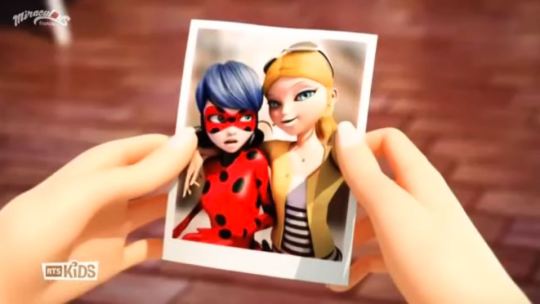
By S3 finale, we see Chloé never accepted the reality of ever be Queen Bee again. And since the finale theme revolved about loss, well, it was time for her to be confronted to it.
We all agree that Hawkmoth exploited the situation during Heart Hunter. He planned the Akumatization of André and Audrey Bourgeois. Nathalie was on place to sabotage of the Bee Signal. And finally, they planned to find the Guardian to get the Miracle Box and offer the Bee Miraculous to have Chloé on their side.
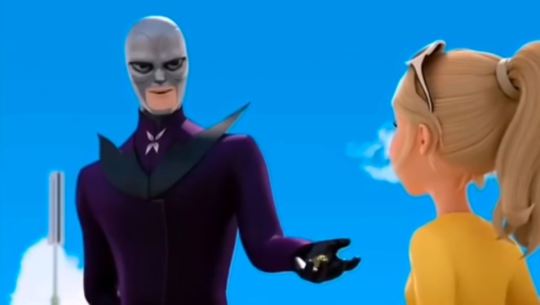
Everything was there to manipulate Chloé, play with her emotions in order to turn her against Ladybug. But keep in mind that during that scene where HM is meeting Chloé, everything he says rings true to Chloé because this is what she internally feels. What he did was only amplifying the feelings Chloé already has since Miraculer and even a bit before that.
Chloé felt ignored, rejected, not allowed to be a superhero, to be a Queen. When Chloé answers Ladybug has done nothing for her, we know it’s not true. Ladybug gave her a second chance. We also know Ladybug is avoiding to give Chloé a Miraculous because she is trying to protect her and her loved ones from HM. Chloé knows that since the end of Miraculers events, however when her loved ones are indeed in danger during Heart Hunter, Chloé expected this would be THE occasion to be Queen Bee again and prove Ladybug wrong by helping Ladybug save her parents.
Now, Ladybug has been distracted and didn’t think of things clearly and yes, there is a chance that on other circumstances she might have picked the Bee Miraculous to give it to Chloé, but there is also the fact Chloé kept repeating the same mistake.
We have seen through S3 Chloé is constantly building her expectations up, only to set herself for disappointement. And instead of realizing that about herself, especially after Miraculer, she continues doing that and gets angry and put the blame on others. The only one making Chloé wait is Chloé herself. All the other temporary Holders have other things to occupy themselves and they do what they can as civilians, not expecting LB to come and give them a Miraculous.
But Chloé’s entitlement to the Bee Miraculous clouds her judgment there and now, HM is there is offering Chloé something Ladybug has denied to give her again.
So, Chloé prefered being Queen Bee over doing the right thing. She had the chance to double cross HM, but she didn’t because of how hurt and furious she was at Ladybug. And even after being deakumatized, that angers and feeling of betrayal persist.

And this is where Chloé’s action matters the most here. Chloé not only tries to be reakumatized by choice again, she blantantly explains she isn’t on Ladybug’s side anymore, doesn’t care if HM who terrorizes Paris is the ennemy, that she will keep the Miracle Box for herself. Chloé also rudly orders the Kwamis around without knowing how it works. She even tries to run away with the new Miracle Box and finally, when everything is falling appart and doesn’t go her own way, Chloé throws at tantrum at Ladybug, insulting her and the other temporary Holders and affirm she will leave with the Bee Miraculous to New York.
Even HM who laughs at this at first, commenting he doesn’t need to do anything, that Chloé is one of the bad guys, eventually is disappointed before leaving her behind.
Ladybug? She tries to reason with Chloé, giving her another chance to fix her mistake like at the end of Queen Wasp. When Chloé is putting all the remaining Miraculous of the Box on her, LB asks to stop because she knows how dangerous it is to combine their powers and still doesn’t want Chloé to get hurt. It’s only after Chloé tries to run off with the new Miracle Box that Ladybug stops her. And when Chloé is done talking, LB has no choice to stop this and take back herself the Bee Miraculous from her, even apologizing for doing this.
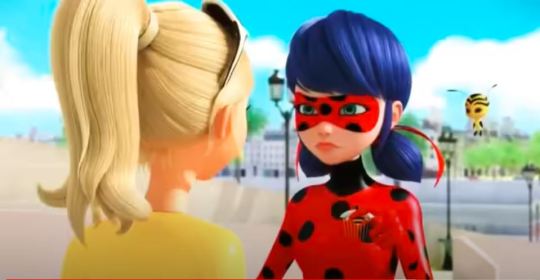
Ladybug has been very patient. She knows Chloé. She knows she is hurt and is hurting other because that’s how she copes, but Ladybug cannot let Chloé keep that Miraculous. Heck, she even feel sorry for Chloé when she finally leaves.

Is that truly the face someone who is satisfied with this result? This wasn’t what Ladybug had hoped for Chloé either.
If, through S3, it was no one’s fault for the Bee Miraculous to not be given to Chloé, her being destituted of the Bee Miraculous at the end of S3 was the consequences of Chloé’s own actions and her refusal to change. And all of this could have been prevented if Chloé didn’t become entitled to the Bee Miraculous, if Chloé had found another purpose AS A CIVILIAN rather than to depend on the prestige of her Queen Bee persona
This isn’t the end though. It only means Chloé has more work to do about herself. And that giving Chloé a Miraculous isn’t the solution to improve her.
#Anonymous#miraculous ladybug#chloé bourgeois#ml analysis#sorry it took so long anon#here you are#I hope you enjoy!
43 notes
·
View notes
Text
on my frustrations with new girl, a ridiculously long meta by fee
I just finished New Girl for the first time, and I really loved it. But I was also consistently frustrated by it, and I want to dig into that here. (There’s a tl;dr at the end if you don’t feel like wading through ~1300 words lmao).

Why was I frustrated by New Girl? I think because I felt like it had potential to be a really excellent show, but it never quite reaches those heights and instead it often feels mediocre with some stand-out moments. A big part of that is how they handle the Nick/Jess relationship, and moreover, how they handle that relationship in comparison to how they handle the Cece/Schmidt romance.
Cece and Schmidt's arc feels very intentional over a number of seasons: They have a plan for that relationship and it shows: The slow growth of their friendship, the mutual pining, the big moment proposal. (I even don't mind Schmidt's cheating storyline because of the way the show handles his redemption and his slow character development until he's in a place to date Cece).
With Nick and Jess, it feels like the writers/showrunners panicked once they got together, broke them up, and then forgot to follow up on the storyline at all until mid season 6. I didn't mind, and was quite honestly expecting, a breakup between them. But I was also expecting that the breakup would facilitate character development and storylines. Outside of the episodes immediately following their breakup...it just doesn't.
It never really feels like Nick or Jess get a character arc that addresses the flaws that made them break up in the first place, so when they get back together it hardly feels like anything has changed. And if that's the case, why break them up in the first place?? (Why spend all of the second-last season with Jess/Robbie and Nick/Reagan who felt like filler characters at best??)
I know that Nick and Jess are arguably the A-couple to Schmidt and Cece's B-couple, but the way the show handles their arcs almost feels like the reverse. (See also: their respective wedding episodes). And I may be biased because I have a clear preference for Nick/Jess, but it does make me sad. Nick and Jess are DYNAMIC together. (Just look at their first kiss!!) Why rob us of that for so long without reason?
(Don't get me started on the underutilization of Winston as a character and the fact that we didn't get to see his and Aly's wedding).
And about the breakup. It honestly feels like it comes out of left field a little bit. We've had a couple episodes previous that explicitly focus on Nick trying to change for and support Jess. He plans her a birthday party. He rallies everyone to take Jess' class on a school trip. Even at the end of The Box (in which Nick is dummy and not at his best pretty much the whole time) it ends with him making a compromise and opening a bank account. And at the same time in all these episodes, it resolves with Jess seemingly satisfied that Nick is trying to meet her halfway on the things she cares about. I could see the fight they have leading to a temporary breakup, but to essentially be The Breakup of the main couple?? It just feels random and petty and, ultimately, unsatisfying.
Let's talk about Nick for a sec, too. His character really suffers from being inconsistently written. And it gets worse in the later seasons. Personally, I love the way they started out writing Nick--gruff and angry, but really because he cares too much; a mess that can't take care of himself but takes care of everyone around him; lazy but somehow also surprisingly astute about what he wants. Those are some really interesting contradictions and character traits that, in my opinion, are the start of a really compelling character. (I love the scene where he shows Jess that he did pass the bar, he just knows he doesn't want to be a lawyer).
But as the show goes on, it tends to forget about the complexities of Nick and instead go for these big swing comedic moments that centre on his more straightforward character flaws (his emotional immaturity, his stupidity, his stubbornness)--think Nick's storylines in "Hubbedy Bubby" or "James Wonder" in season 6. I do like what they do with his author arc, but I feel like they don't dig into it as much as they could have. That's really going to be a theme in this piece of meta, I think. (And side note: Nick has got some major anxiety going on. Remember when he freaks out and hides at his book reading? What I wouldn't give to have that addressed in a semi-humourous way).
And it boils down to my opinion, but I liked when New Girl let itself have moments of sincerity and emotion. Think The Injury or Chicago (two of my favourite episodes). Or the episode where Cece learns she might not be able to have kids (Eggs). These notes of seriousness sandwiched between the jokes start to diminish as the show goes on.
A good example of this is The Crawl in season 4, which I kept waiting to pivot into a moment of semi-serious introspection on Nick's part--for him to snap out of the bar crawl festivities and realize his hurt feelings over his and Kai's breakup-- but instead New Girl skirts around it in the last few minutes of the show. The moment is there, but the show doesn't let itself push into any sort of serious territory, instead keeping things very light and comedic.
I understand that they chose to lean into comedy, but I always like my sitcoms just real enough that it could be plausible to believe the characters are real. And I think sometimes having a serious moment or two in lets the comedy stand out in opposition. I think New Girl started in a more balanced comedy/seriousness direction in seasons 1 and 2, and maybe part of 3, and then makes the decision to move away from that. (With the exception, arguably, of the Schmidt/Cece storyline, which, again, maintains wonderful moments of sincerity throughout the show's run). In my opinion, this is to New Girl's detriment.
Interestingly, I feel like it's Jess that actually gets the fewest "real" moments throughout the show. For the title character, she really gets the least amount of an arc. Even the inconsistently written Nick gets a small growing up arc as he becomes the owner of the bar and starts his writing career. Jess gets some semblance of a professional arc, becoming vice-principal and then principal, but then by the end of the show is fired all over again?? (Side note: It might just be the cultural differences between Canada and the US, but nothing about Jess' teaching career is accurate). And in her personal and dating life, Jess just keeps dating guys who she finds to be okay and decently attractive and then breaking up with them, with no real progression for her character. Don't get me wrong. I love Jess. I love that she gets to be goofy and quirky and girly and still competent and smart and caring. But she gets so little character development for being a titular character. It's frustrating.
I think a lot of these frustrations come from the way the show was constructed. I've watched quite a few interviews and it sounds like the writers really didn't have any plans let the characters develop organically. Plus there was a lot of improvisation. I think that really added to the humour and great vibe of the show, but I also wonder if it was detrimental to the creating cohesive overarching plots and character development.
tl;dr I love New Girl, but they handled Nick and Jess' relationship rather poorly. They didn't really give Nick or Jess a thought-out character arc and it means their very dynamic and interesting relationship suffers. I wish they leaned into moments of emotion and seriousness more. And I really wish I got more Nick/Jess kisses like the one we saw in Cooler.
#new girl#new girl meta#fee says stuff#fee writes meta#someone pls talk about this show with me#i'm a little bit in love with nick miller#jess day#nick miller#nick x jess#nick miller x jess day#ness#jess day meta#nick miller meta
19 notes
·
View notes